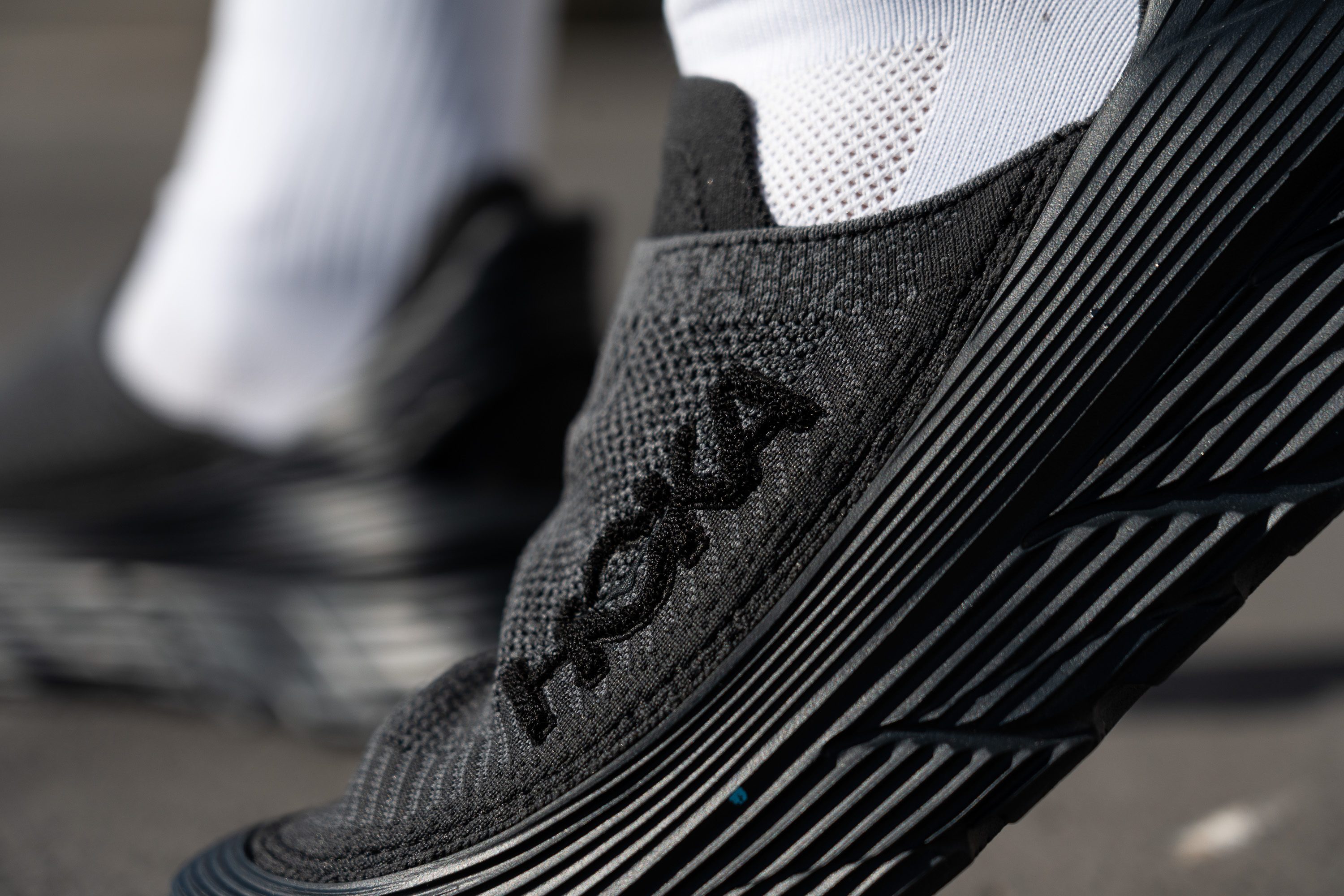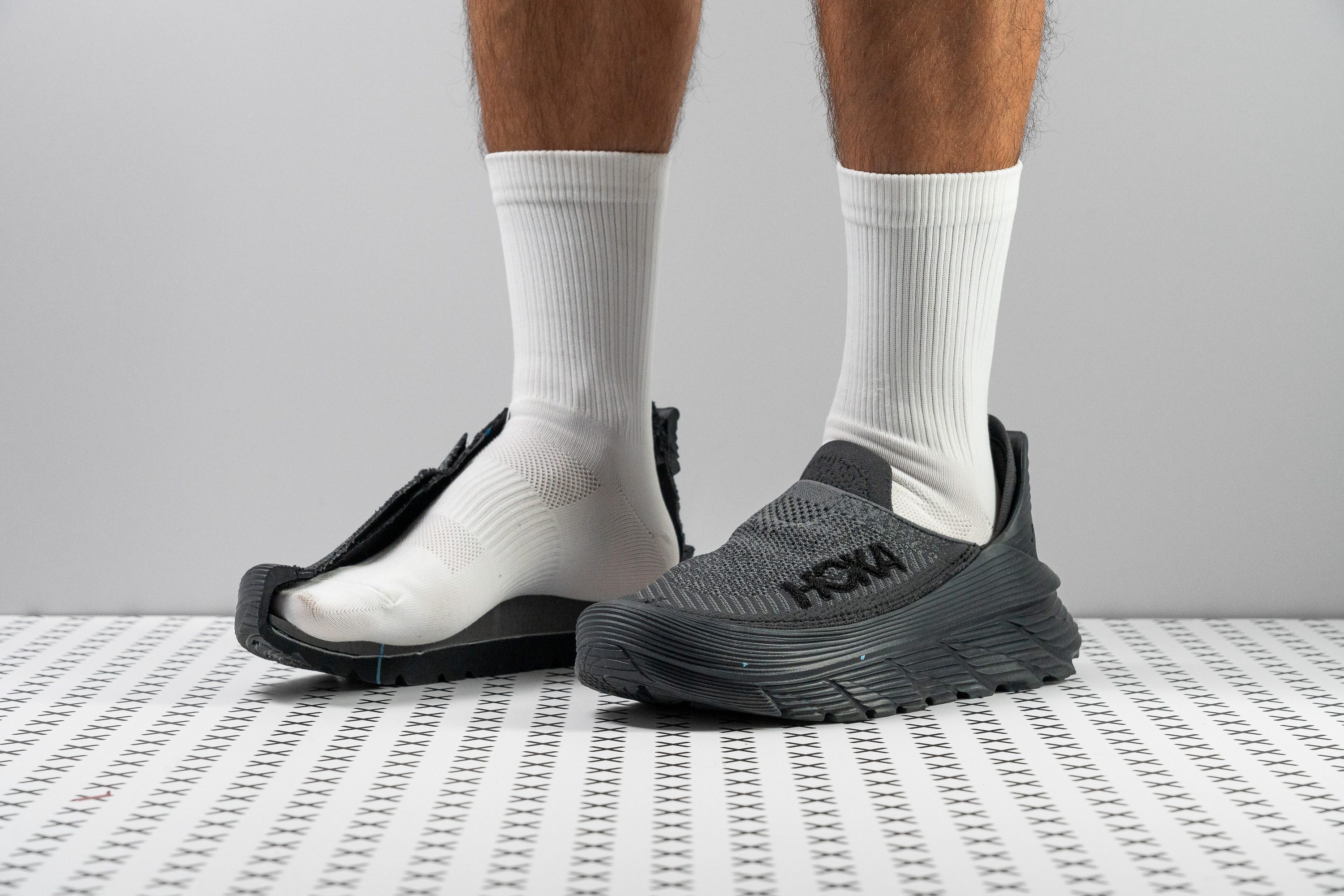Our verdict
Pros
- Super easy on-and-off
- Soft, bottomless cushioning
- Cosy, sock-like in-shoe feel
- Very wide platform
- Rocker sole creates smooth transitions
- Good traction on smooth floors
- Fantastic upper durability
- Sustainable materials
- Sustainable materials
Cons
- Not breathable
- Exposed foam wears fast outdoors
- A bit heavier than average
- Toebox is not as wide as it seems
Audience verdict
Comparison
The most similar walking shoes compared
+ + Add a shoe | |||||
|---|---|---|---|---|---|
| Audience score | 75 Bad! | 90 Great! | 82 Decent! | 91 Great! | |
| Price | £110 | £150 | £130 | £100 | |
| Arch support | Neutral | Neutral | Neutral | Neutral | |
| Shock absorption | Moderate | High | Moderate | High | |
| Energy return | High | High | Moderate | High | |
| Traction | High | High | - | Moderate | |
| Orthotic friendly | ✓ | ✓ | ✓ | ✓ | |
| Weight lab Weight brand | 11 oz / 313g 11.3 oz / 320g | 9.4 oz / 266g | 10.9 oz / 309g 10.9 oz / 309g | 10.8 oz / 306g 10.8 oz / 305g | |
| Lightweight | ✗ | ✓ | ✗ | ✗ | |
| Breathability | Warm | Warm | Warm | Moderate | |
| Use | CityDisneyEuropeRecovery | For standing all dayTravelCityDisneyEuropeFor nurses | For standing all dayCityDisneyEurope | CityDisneyEurope | |
| Size | True to size | True to size | True to size | True to size | |
| Midsole softness | Balanced | Balanced | Balanced | Soft | |
| Difference in midsole softness in cold | Big | Normal | Big | Small | |
| Insole thickness | Very thick | Very thin | Average | Thin | |
| Removable insole | ✓ | ✓ | ✓ | ✓ | |
| Stiffness | Moderate | Moderate | Stiff | Moderate | |
| Torsional rigidity | Moderate | Stiff | Stiff | Stiff | |
| Heel counter stiffness | Flexible | Flexible | Moderate | Flexible | |
| Heel tab | Extended heel collar | None | Finger loop | None | |
| Drop lab | 7.5 mm | 8.7 mm | 8.0 mm | 9.3 mm | |
| Heel stack lab | 32.7 mm | 35.5 mm | 34.1 mm | 34.9 mm | |
| Forefoot | 25.2 mm | 26.8 mm | 26.1 mm | 25.6 mm | |
| Width / fit | Narrow | Medium | Narrow | Narrow | |
| Toebox width | Medium | Medium | Narrow | Medium | |
| Closure | Slip-on | Bungee laces | Bungee laces | Laces | |
| Toebox durability | Good | Good | Good | Good | |
| Heel padding durability | Decent | Bad | - | Decent | |
| Outsole durability | Bad | Good | - | Decent | |
| Midsole width - forefoot | Average | Wide | Average | Average | |
| Midsole width - heel | Very wide | Wide | Average | Wide | |
| Outsole hardness | Soft | Average | Average | Very hard | |
| Outsole thickness | Average | Average | Average | ||
| Tongue padding | Thin | Average | Average | Thick | |
| Tongue: gusset type | Sock like | Both sides (semi) | None | Bootie | |
| Material | - | Mesh | - | Mesh | |
| Ranking | #36 Bottom 1% | #16 Top 45% | #34 Bottom 5% | #7 Top 20% | |
| Popularity | #15 Top 42% | #4 Top 12% | #3 Top 9% | #8 Top 23% |
Who should buy
We think that the Hoka Restore TC hits the nail on the head for people who need:
- an extra comfortable pair for day-to-day use
- a shoe for active recovery from sports
- a slip-on kick with a super quick and easy on-and-off
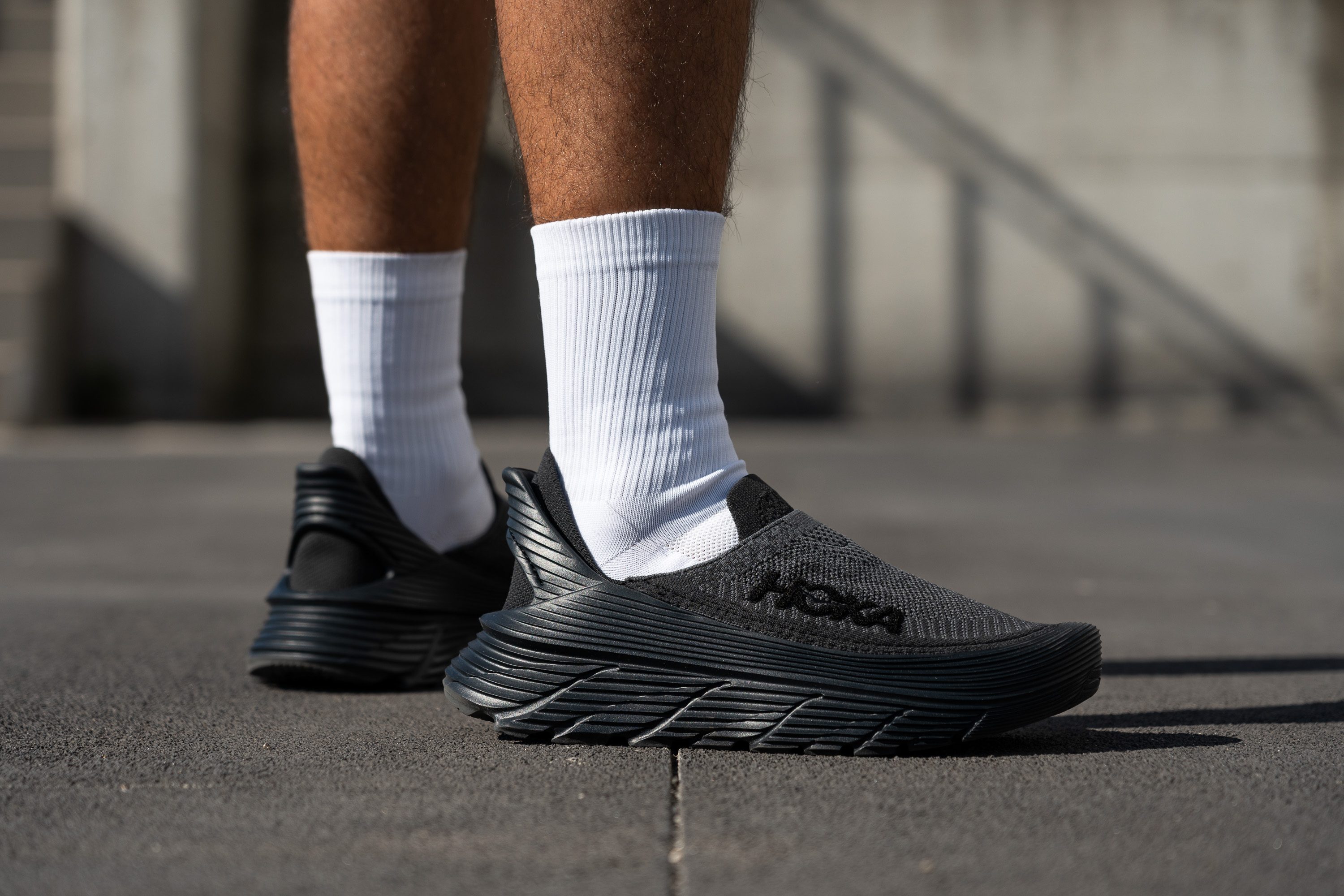
Who should NOT buy
And if you want an equally cushioned and cosy slip-on but in a lighter and sleeker package, we highly recommend the GO WALK 6 and the GO WALK Flex from Skechers.
If you want to experience the benefits of the Hoka Restore TC but feel uncertain about its visual aspect, try the Nike Motiva instead. It is a dedicated walking shoe from Nike that puts comfort first without losing a sleek look. It's not a slip-on shoe though.
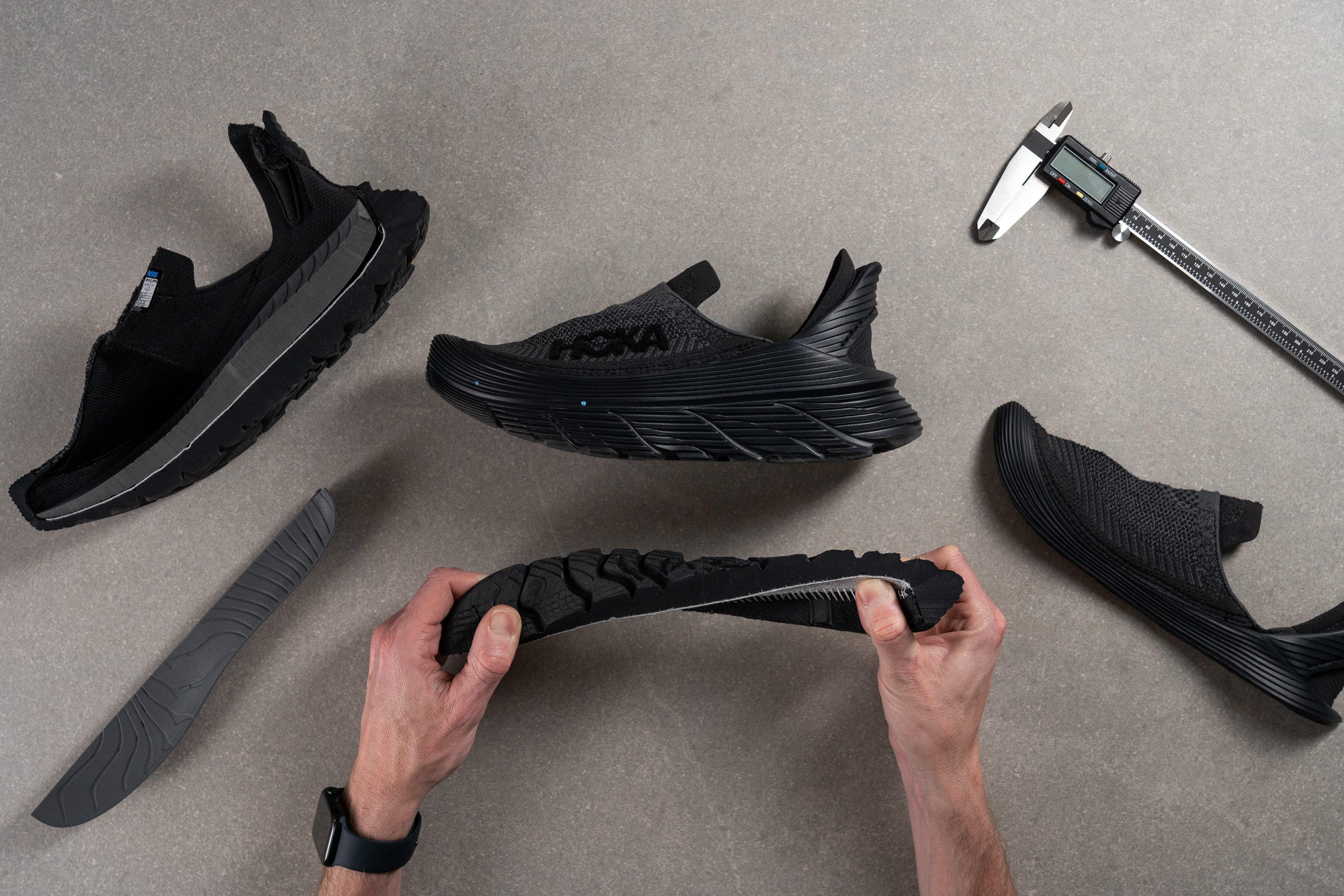
Cushioning
Shock absorption
Considering the amount of foam packed into its midsole, we expected a notably higher shock absorption measurement from the Hoka Restore TC.
However, at 111 SA, it still proved to be on par with the category average, offering enough underfoot cushioning to help our feet relax and restore.
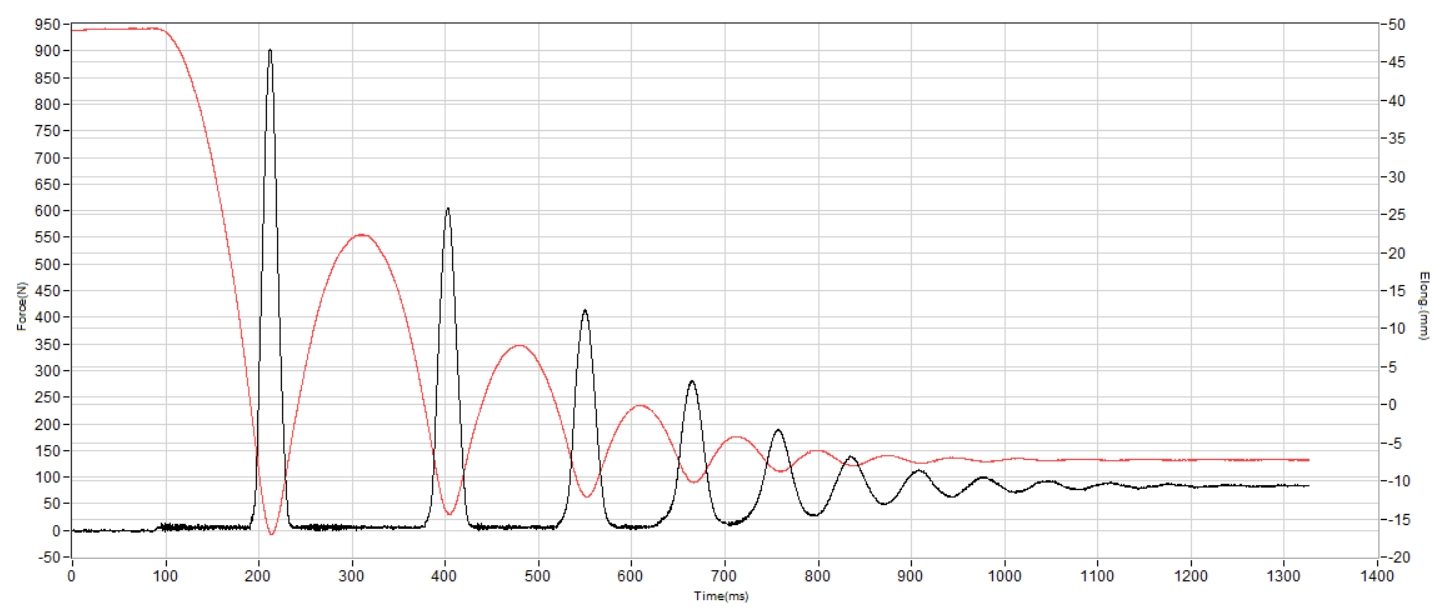
| Hoka Restore TC | 111 SA |
| Average | 111 SA |
Energy return
The Hoka Restore TC also treated our feet to a pleasant rebound, making the ride more enjoyable and smooth rolling. Our test revealed an above-average energy return of 55.1% in this shoe.
| Hoka Restore TC | 55.1% |
| Average | 51.1% |
Heel stack
As a true Hoka shoe, the Restore TC offers a tonne of cushioning.
Measuring its stack height in the heel, our calliper showed 32.7 mm. Even though it is nearly the same as the average, the cushioning feels even more abundant in person.
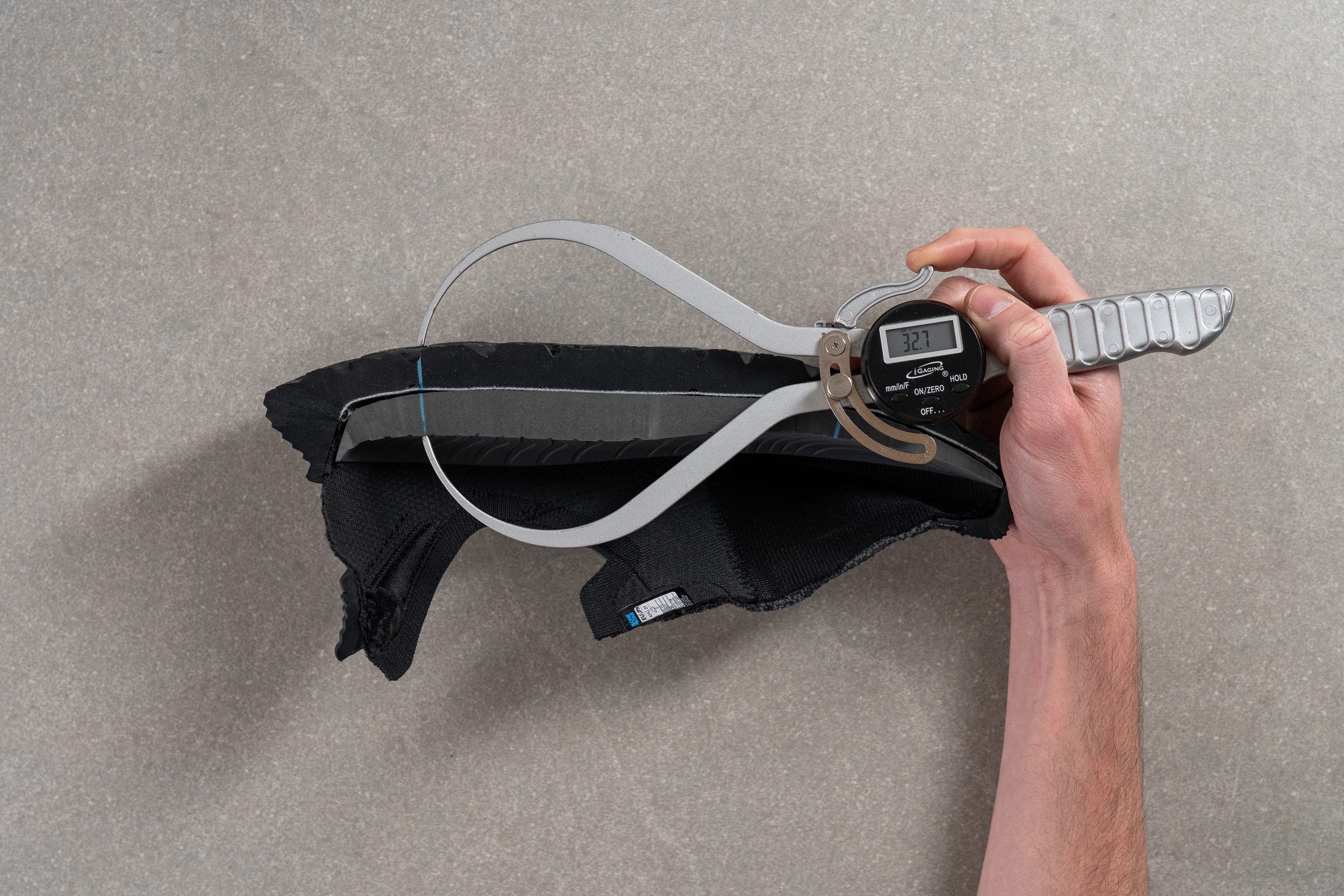
Spending an entire day on feet felt like a breeze in the Restore TC. There is plenty of impact protection, especially if you walk on hard surfaces a lot.
| Hoka Restore TC | 32.7 mm |
| Average | 32.3 mm |
Forefoot stack
A generous helping of foam in the forefoot makes the Restore TC feel more cushioned than other walking shoes.
Measuring its thickness with a calliper returned 25.2 mm which is a few millimetres taller than average. It mutes out the ground feel quite a bit.
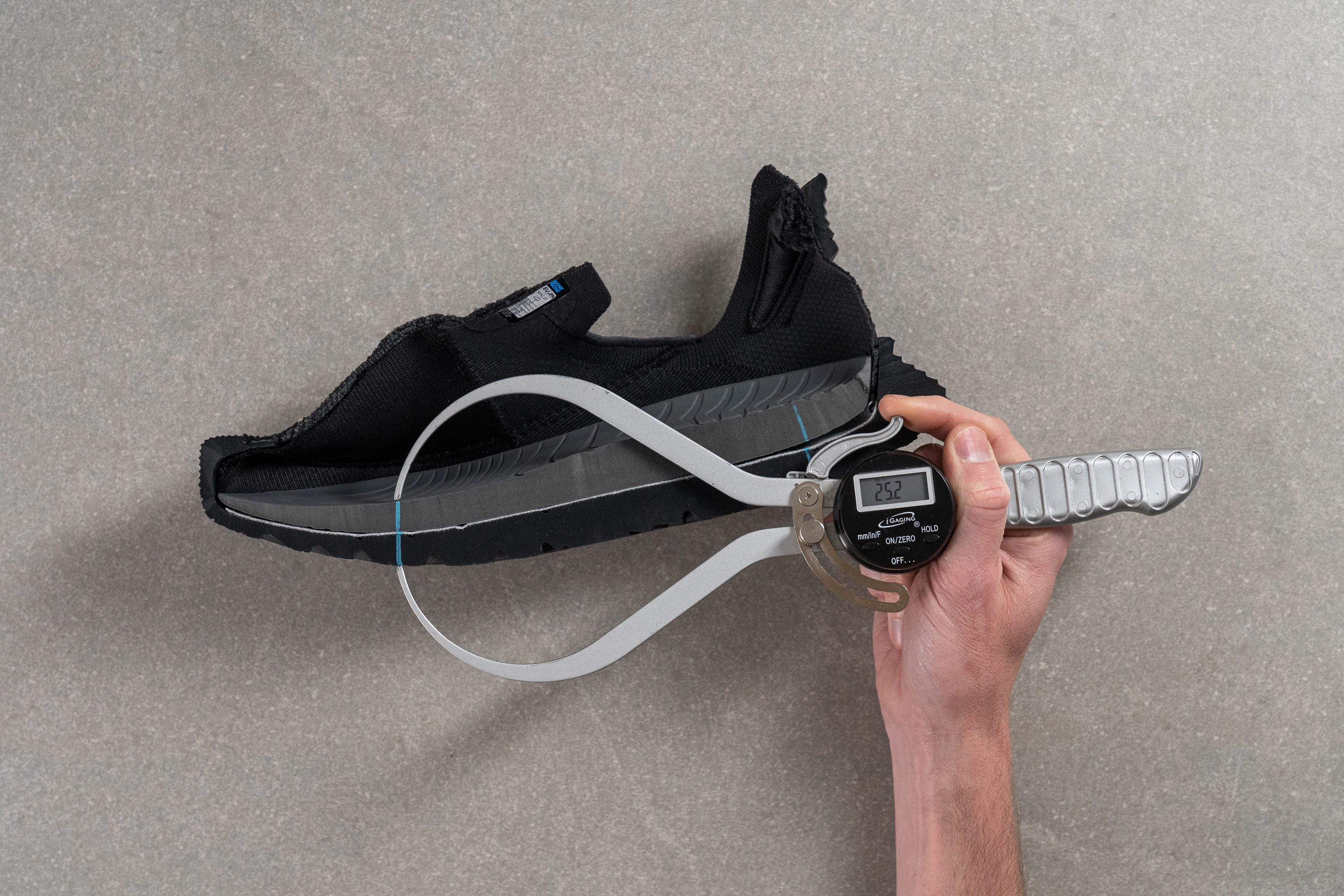
| Hoka Restore TC | 25.2 mm |
| Average | 21.9 mm |
Drop
The difference in stack heights gives us a heel-to-toe drop of 7.5 mm. It is a bit lower than average but not as low as the 5-mm drop claimed by Hoka.
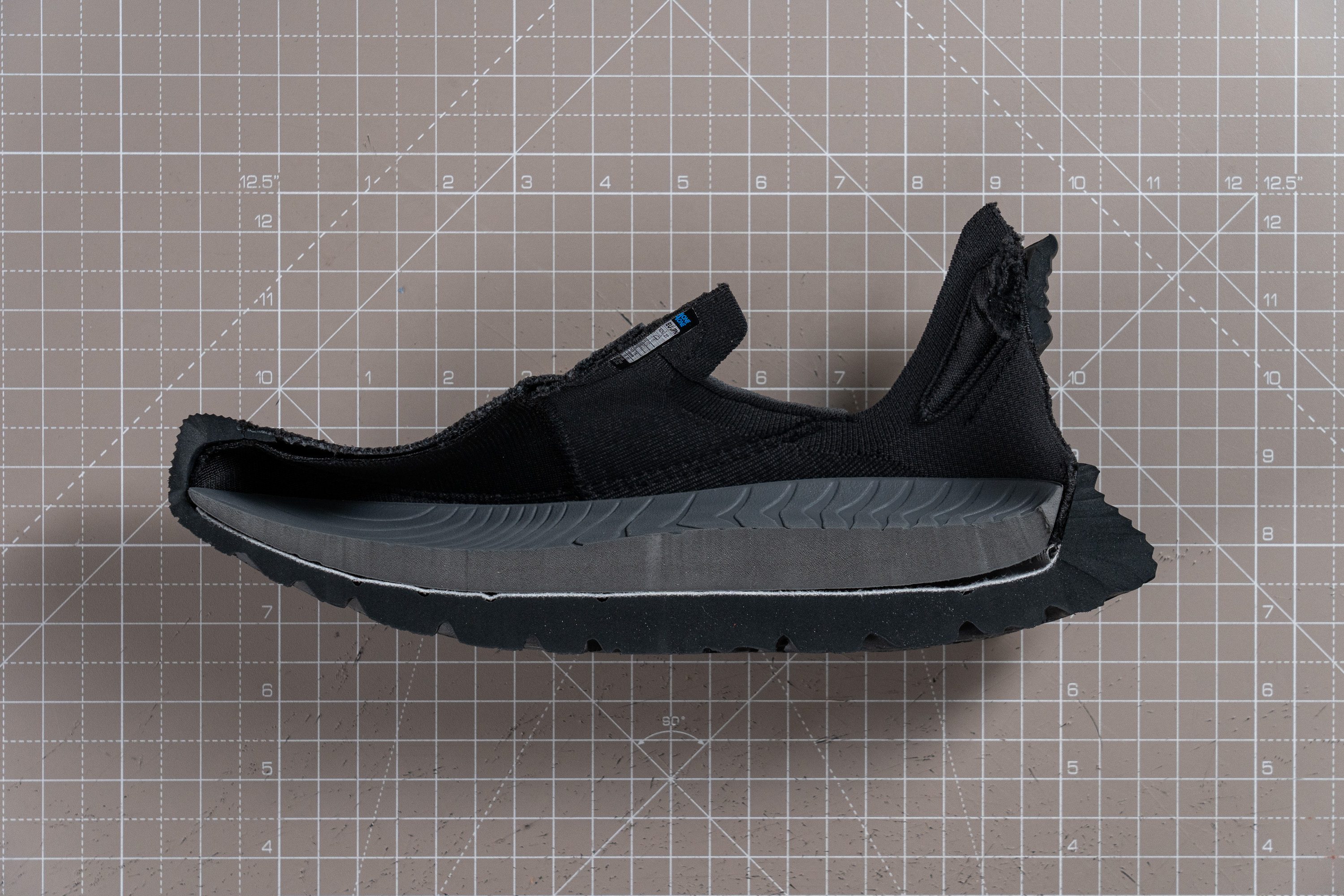
For most folks, however, it won't make any difference on foot. The slight heel elevation above the toes hits a sweet spot between support and a more natural foot positioning.
| Hoka Restore TC | 7.5 mm |
| Average | 10.4 mm |
Midsole softness
Looking inside the half-cut midsole of the Hoka Restore TC, we found that its cushioning comprises the softer insole and the firmer carrier foam.
Together they create a sense of controlled plushness that feels cosy and not wobbly at all.
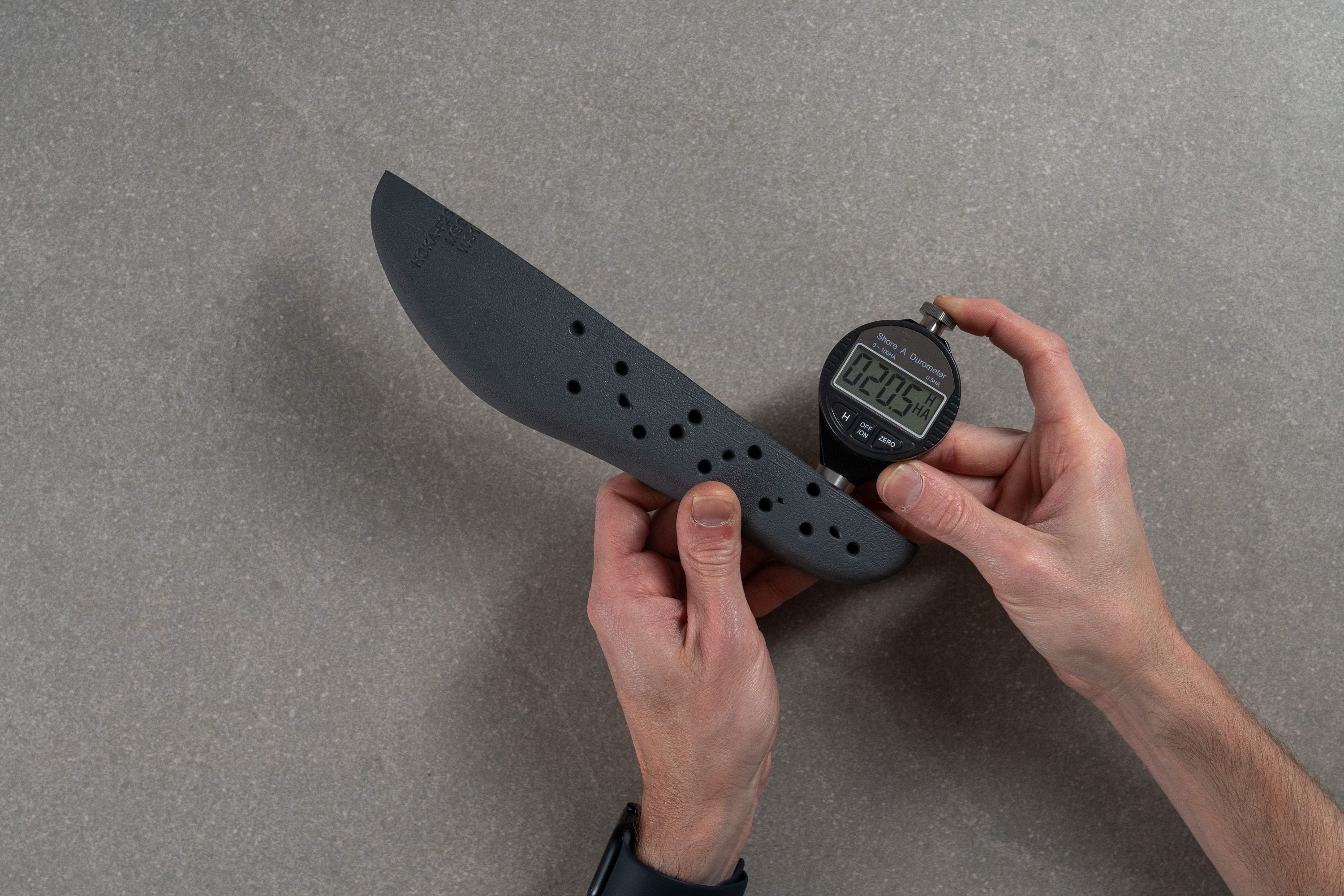
Pressing our durometer against the shoe's insole confirmed its amazing plushness. With a reading of 20.5 HA, it is about 20% softer than the average cushioning foam.
| Hoka Restore TC | 20.5 HA |
| Average | 26.4 HA |
Secondary foam softness
Measuring the softness of the firmer carrier foam with a durometer, we got 30.0 HA. It is indeed firmer than the insole by 46%!
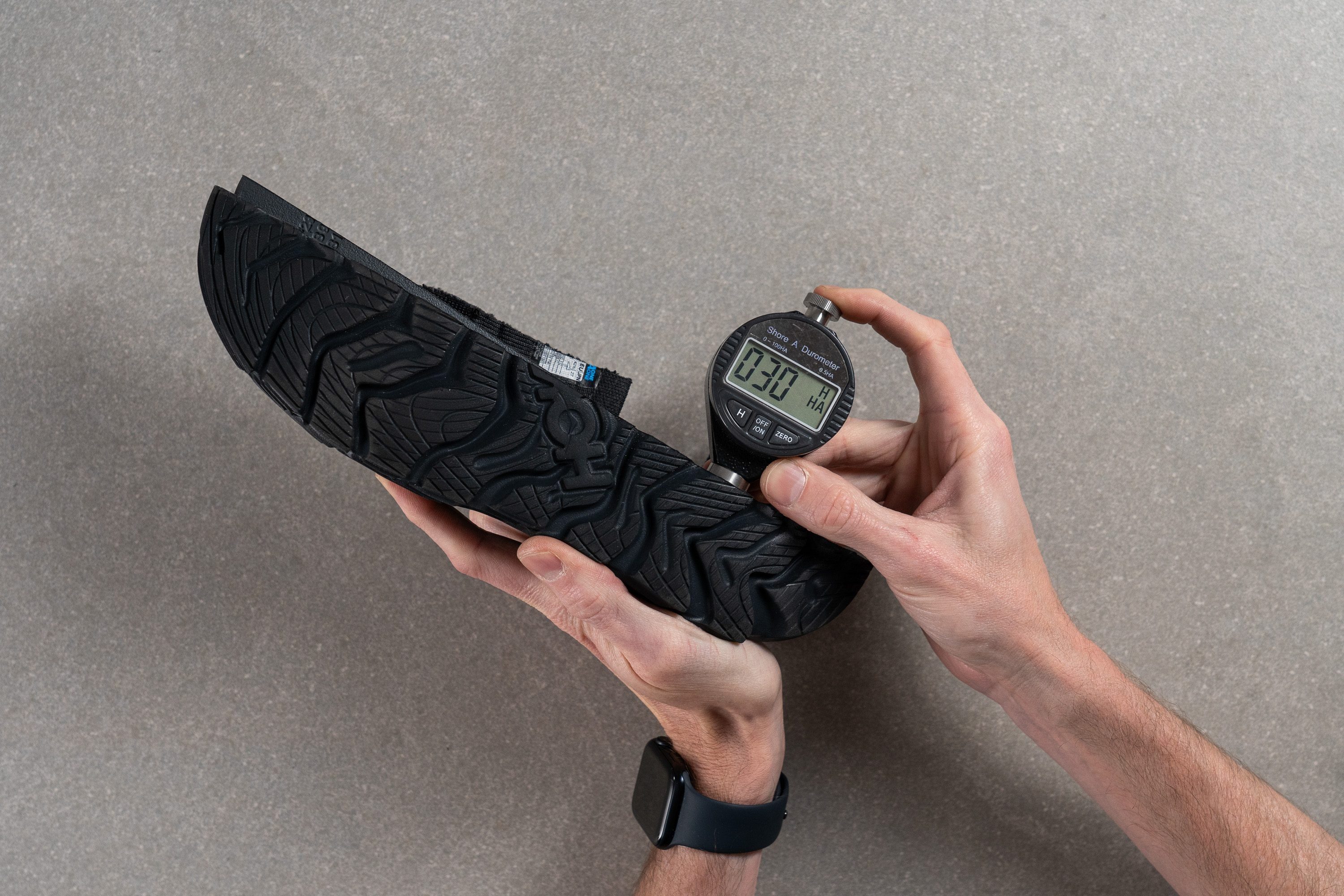
| Hoka Restore TC | 30.0 HA |
Size and fit
Size
Hoka Restore TC fits true to size (231 votes).
Internal length
The Hoka Restore TC fits us like a glove in our regular men's US size 9. We didn't feel the need to size up or down.
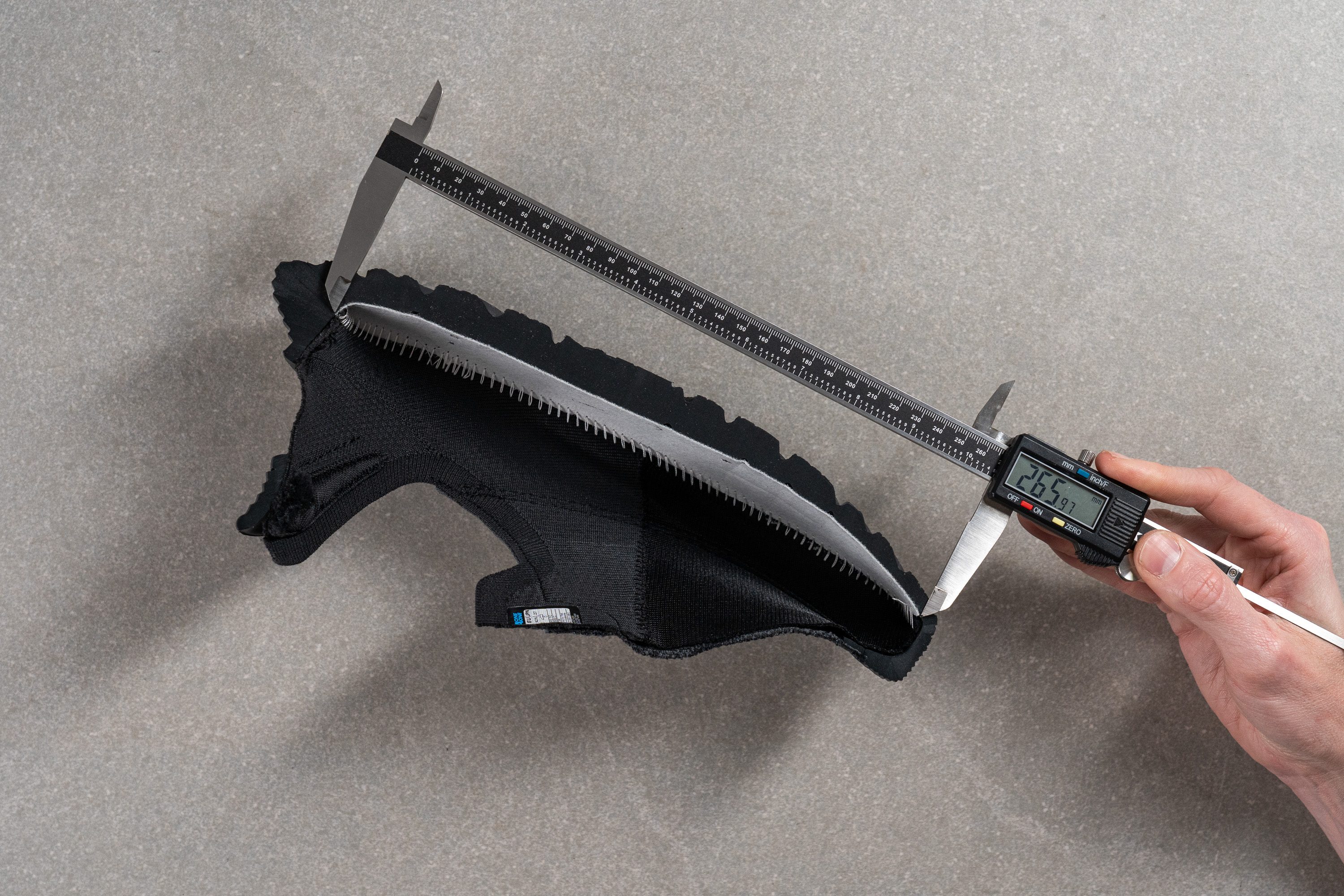
Measuring the shoe's internal length also showed 266.0 mm which corresponds to the US size 9.
It is also important to note that the shoe is unisex and doesn't come in half sizes.
| Hoka Restore TC | 266.0 mm |
| Average | 269.6 mm |
Width / Fit
As a slip-on shoe with a knit upper, the Hoka Restore TC offers a pretty close one-to-one fit without constricting the foot.
But don't let its visually wide fit mislead you. Inside, this Hoka shoe offers no more space than the average walking shoe.
Once the gel mould cooled, we measured its widest part with a calliper. At 92.9 mm, it is no different from most walking shoes we tested in the same size (men's US 9).
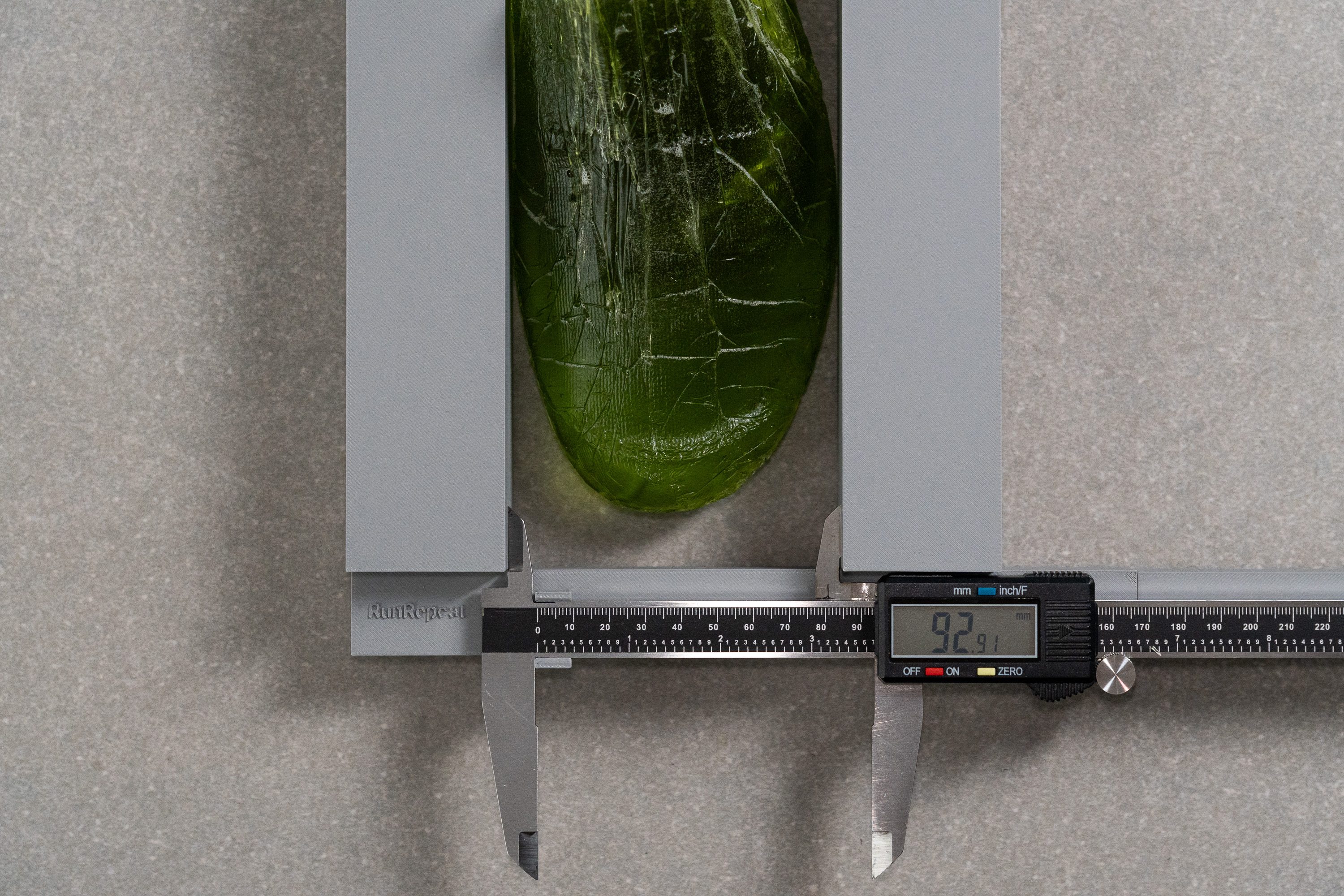
| Hoka Restore TC | 92.9 mm |
| Average | 94.4 mm |
Toebox width
Even the seemingly wide and rounded toebox shape of the Restore TC turned out to be misleading! Large rubber overlays are responsible for making it look bigger than it is.
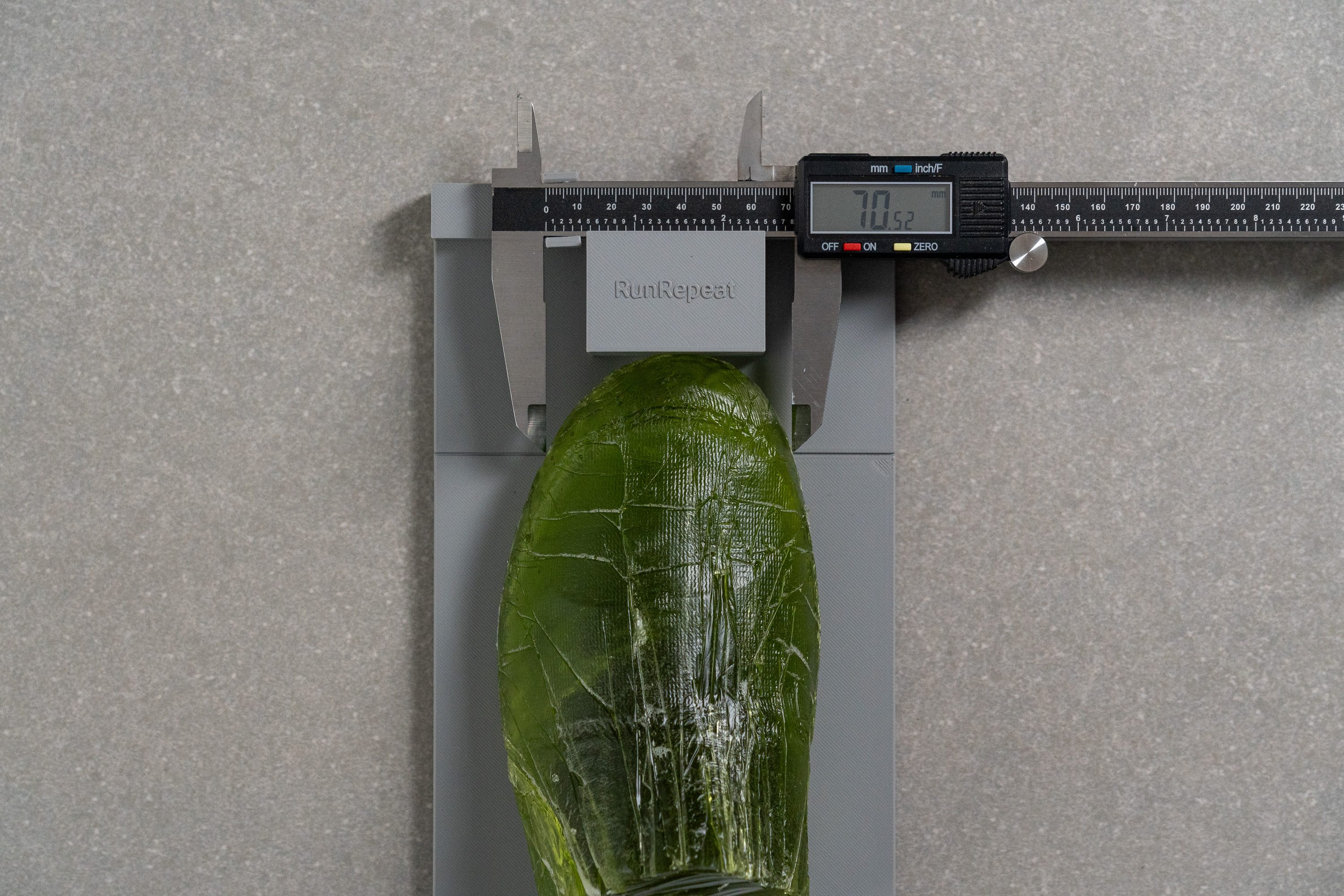
Our mould shows that this Hoka shoe is even slightly narrower than average in the big toe area with a calliper reading of 70.5 mm.
| Hoka Restore TC | 70.5 mm |
| Average | 71.2 mm |
Toebox height
And if you're wondering if the rubber overlays limit the space above the toes - it does not. We found that the shoe's toebox height is on par with the average at 27.1 mm while the knit upper offers some give.
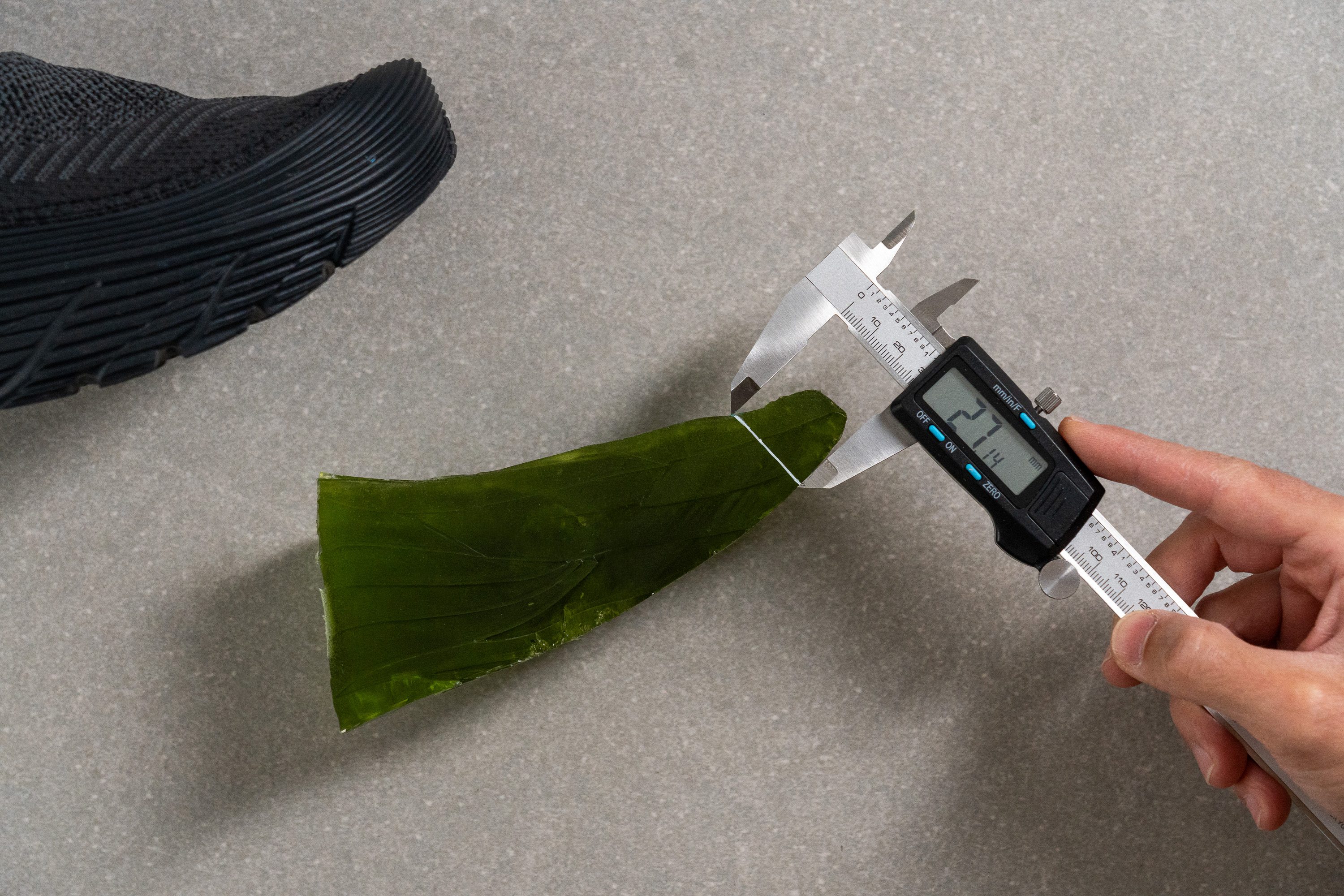
| Hoka Restore TC | 27.1 mm |
| Average | 26.4 mm |
Traction / Grip
Despite the absence of a rubber outsole, this Hoka shoe doesn't fall short of grip on most urban surfaces.

Its exposed foam is softer than rubber and offers tackier contact with the floor.
Traction test
Despite the absence of a rubber outsole, this Hoka shoe doesn't fall short of grip on most urban surfaces. Its exposed foam is softer than rubber and offers a tackier contact with the floor.
To check how much friction the Restore TC's outsole has to resist the forward sheer force of landing, our machine smashed its heel against wet concrete at a consistent force (500N) and angle (7 degrees). The friction score came out great at 0.47, confirming the shoe's ability to bite dry and wet concrete with ease.
Because slipping and falling is the last thing you want when your feet try to rest and recover!
| Hoka Restore TC | 0.47 |
| Average | 0.46 |
Outsole design
The entire bottom of this Hoka shoe is jagged and indented which creates a rather peculiar design. We think that it helps to make the platform of this chunky shoe a little more pliable and the ride smoother.
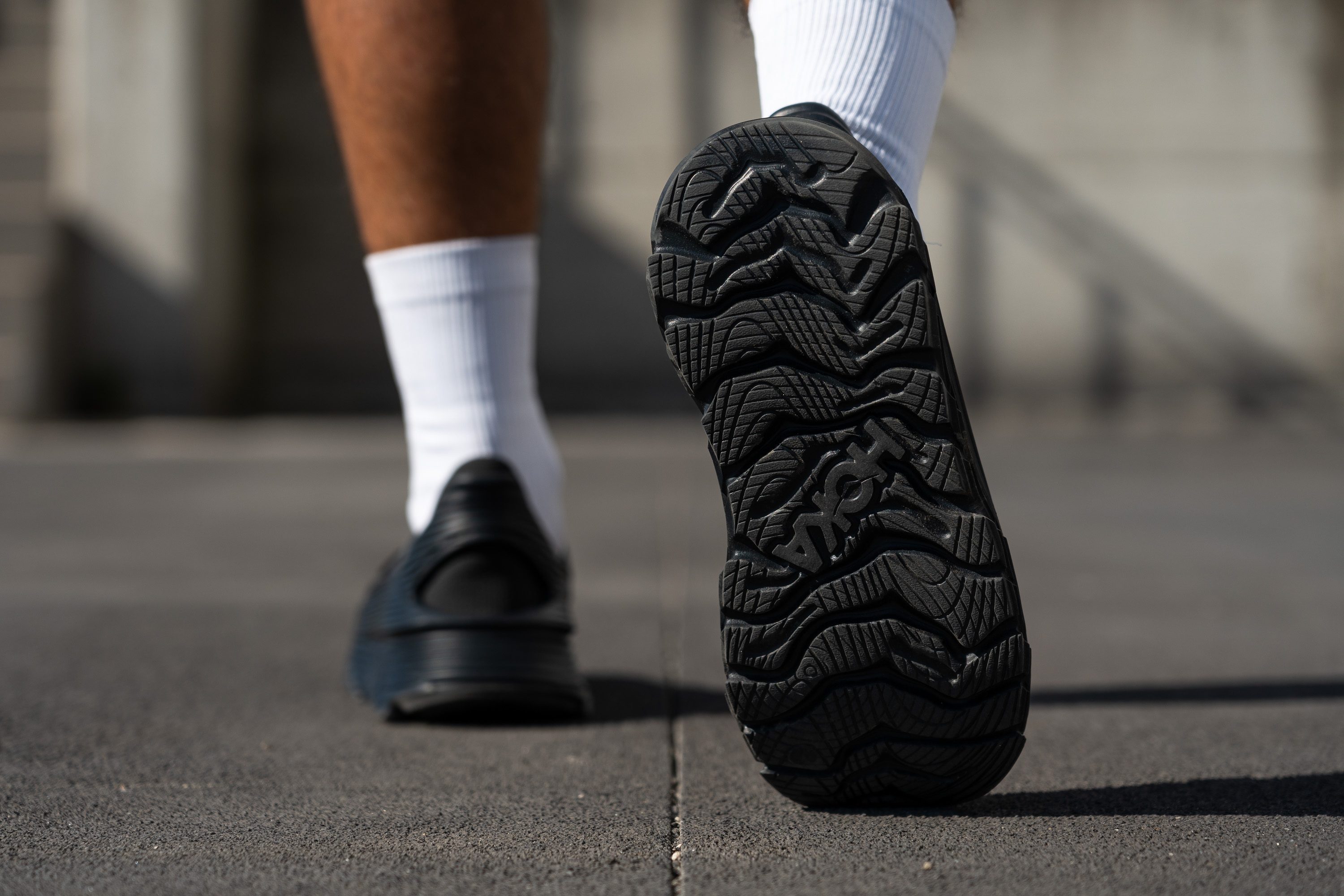
Flexibility / Stiffness
There is not much flexibility in the shoe's forefoot, mainly due to its massive platform. But we wouldn't call it stiff either.
Using a force gauge, we measured that it takes a moderate amount of force (14.5N) to bend the shoe to a 30-degree angle. So just a tad mode rigidity compared to an average walking shoe.
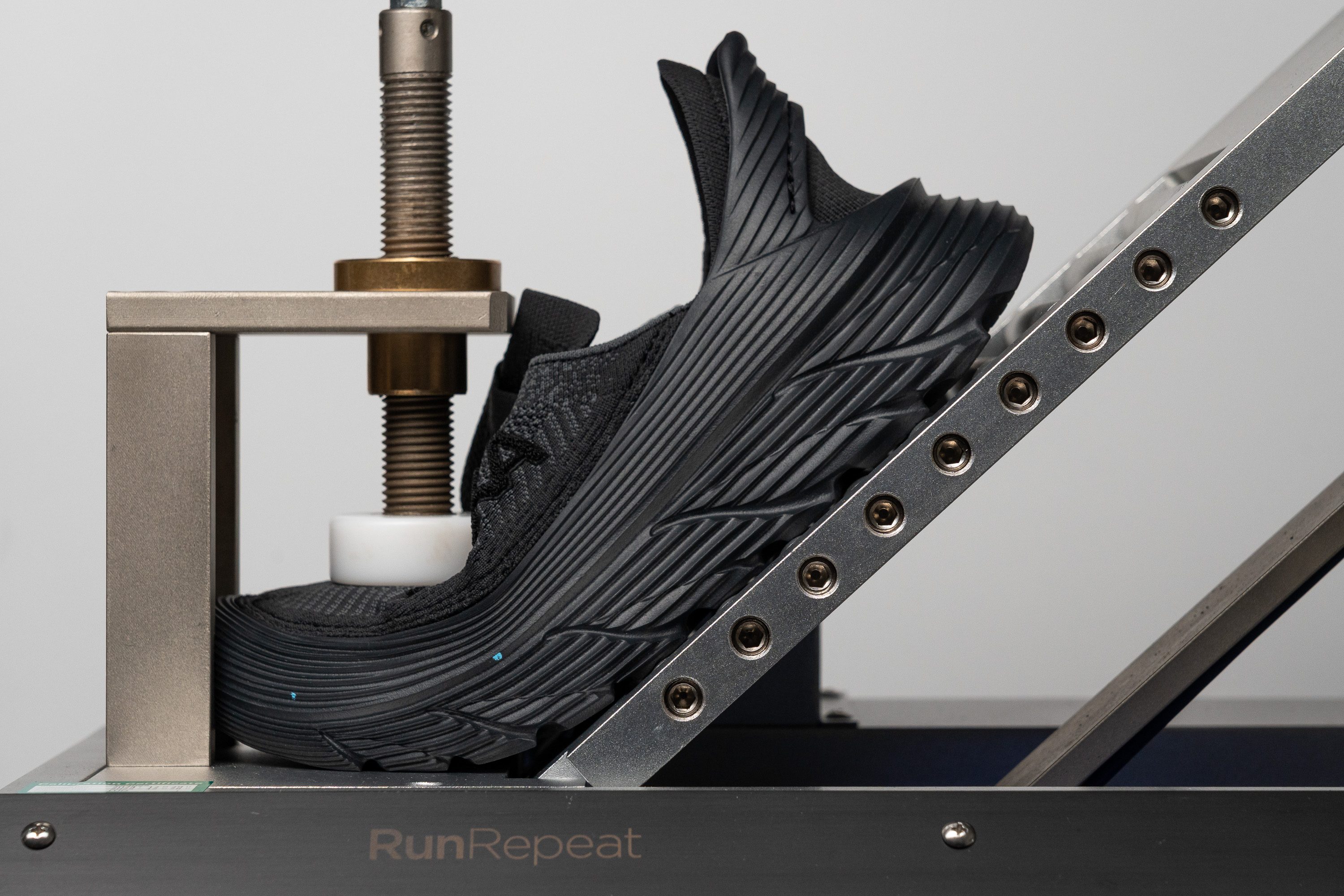
But walking in the Hoka Restore TC feels comfortable nevertheless. The shoe relies on a rockered shape to roll the feet from heels to toes.
More and more walking shoes resort to the rocker shape to create smoother and easier heel-to-toe transitions.
| Hoka Restore TC | 14.5N |
| Average | 13.9N |
Weight
With a tonne of cushioning underfoot and a flared wing-like collar at the back, it is no surprise that the Hoka Restore TC comes with an extra heft.
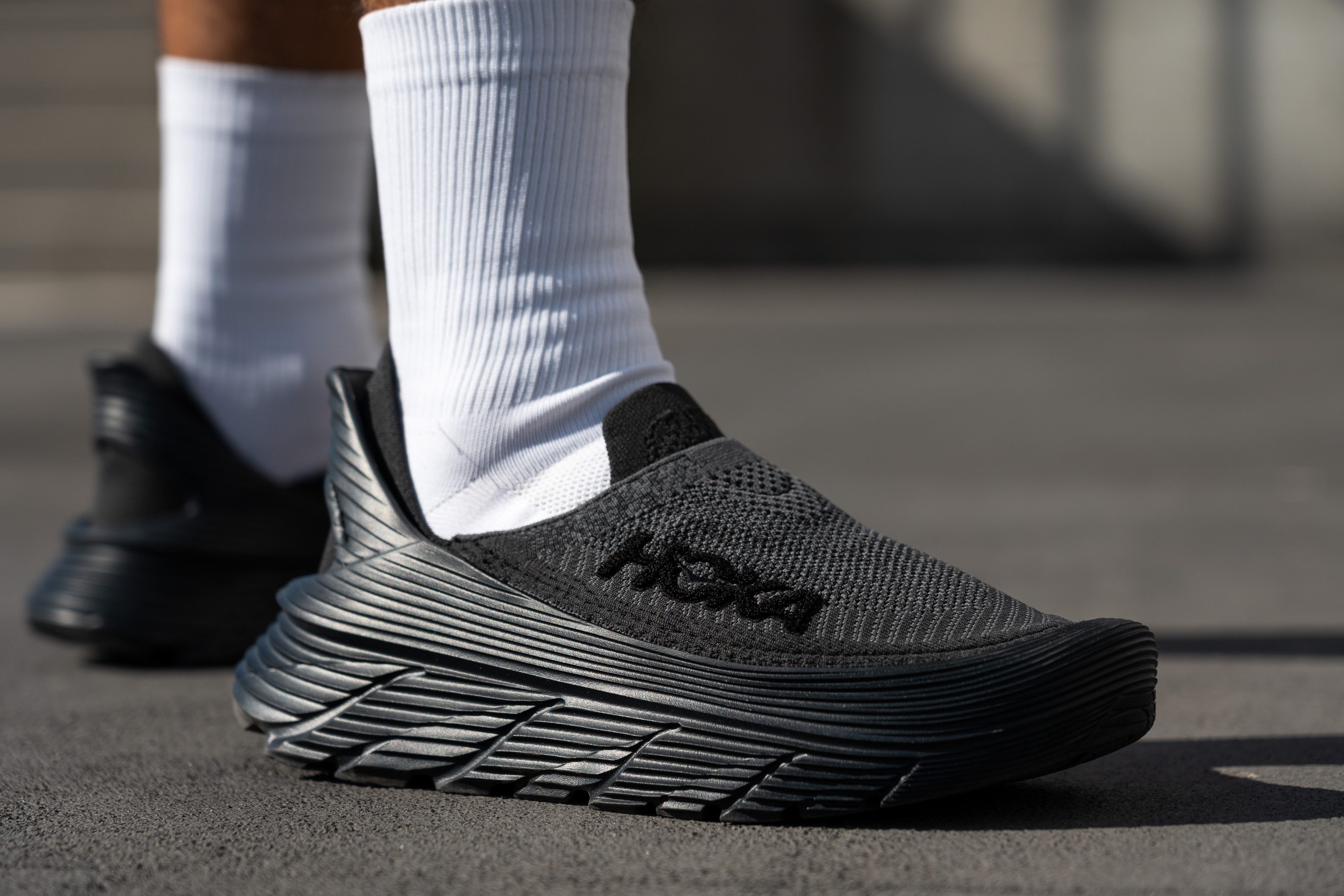
It's not a heavy shoe per se but it feels substantial on foot. Weighing it in a men's US size 9, our scale showed 11.0 oz (313g). It is over an ounce heavier than the average walking shoe.
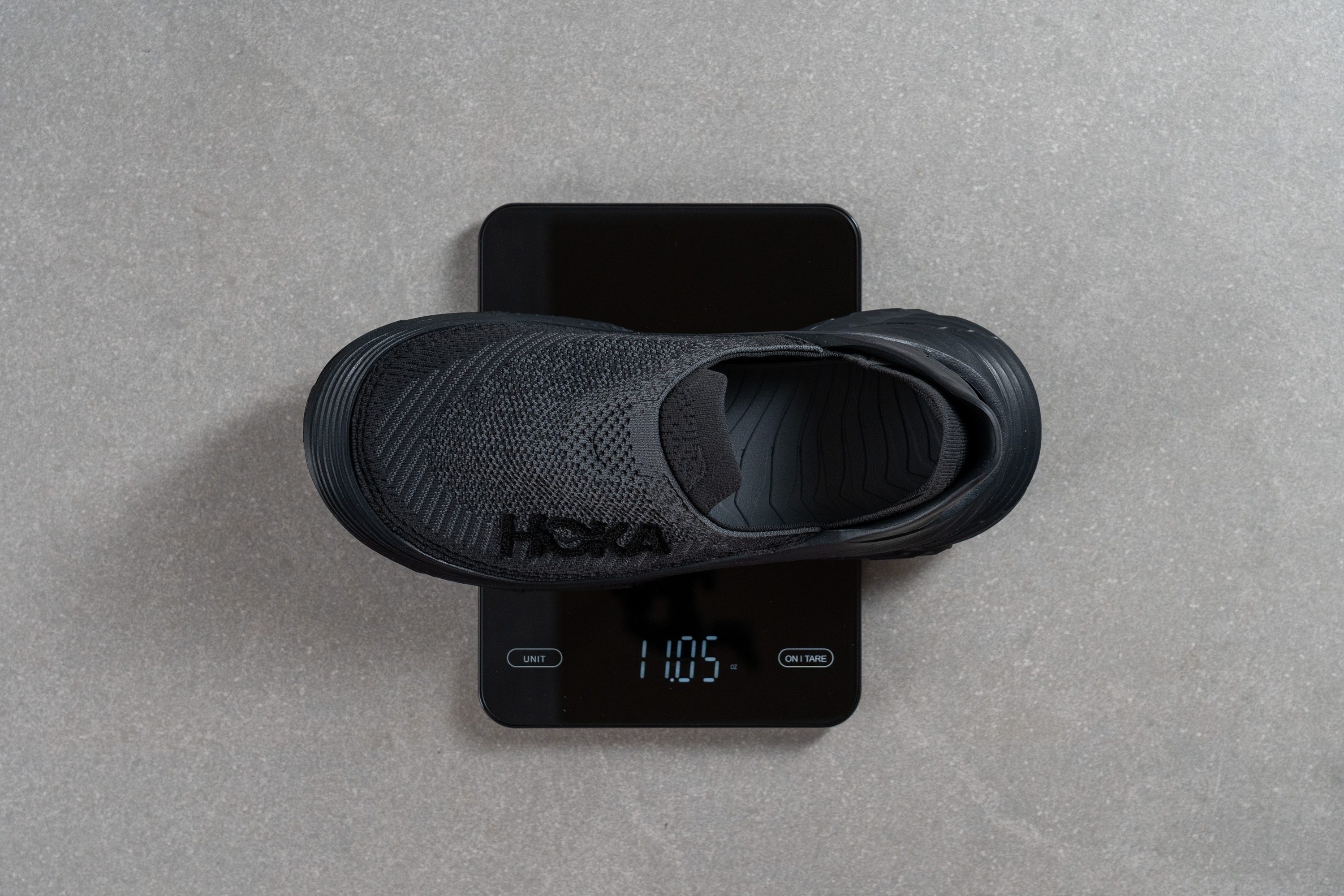
| Hoka Restore TC | 11.0 oz (313g) |
| Average | 10.2 oz (288g) |
Breathability
The knit upper of the Hoka Restore TC feels a lot like a soft sweater around the foot. And unfortunately, it offers just as little breathability.
Filling up the shoe's upper with smoke in our breathability test, we observed that none of it passed through the fabric! Unlike the smoking mesh upper on the right, the Restore TC's knit failed to breathe.
Our transparency test also proved that this Hoka shoe has no ventilation holes to aerate the interiors. Even when we looked at the fabric up close through a microscope, we saw no pores that could help the airflow.

It's just a plushy sweater through and through.
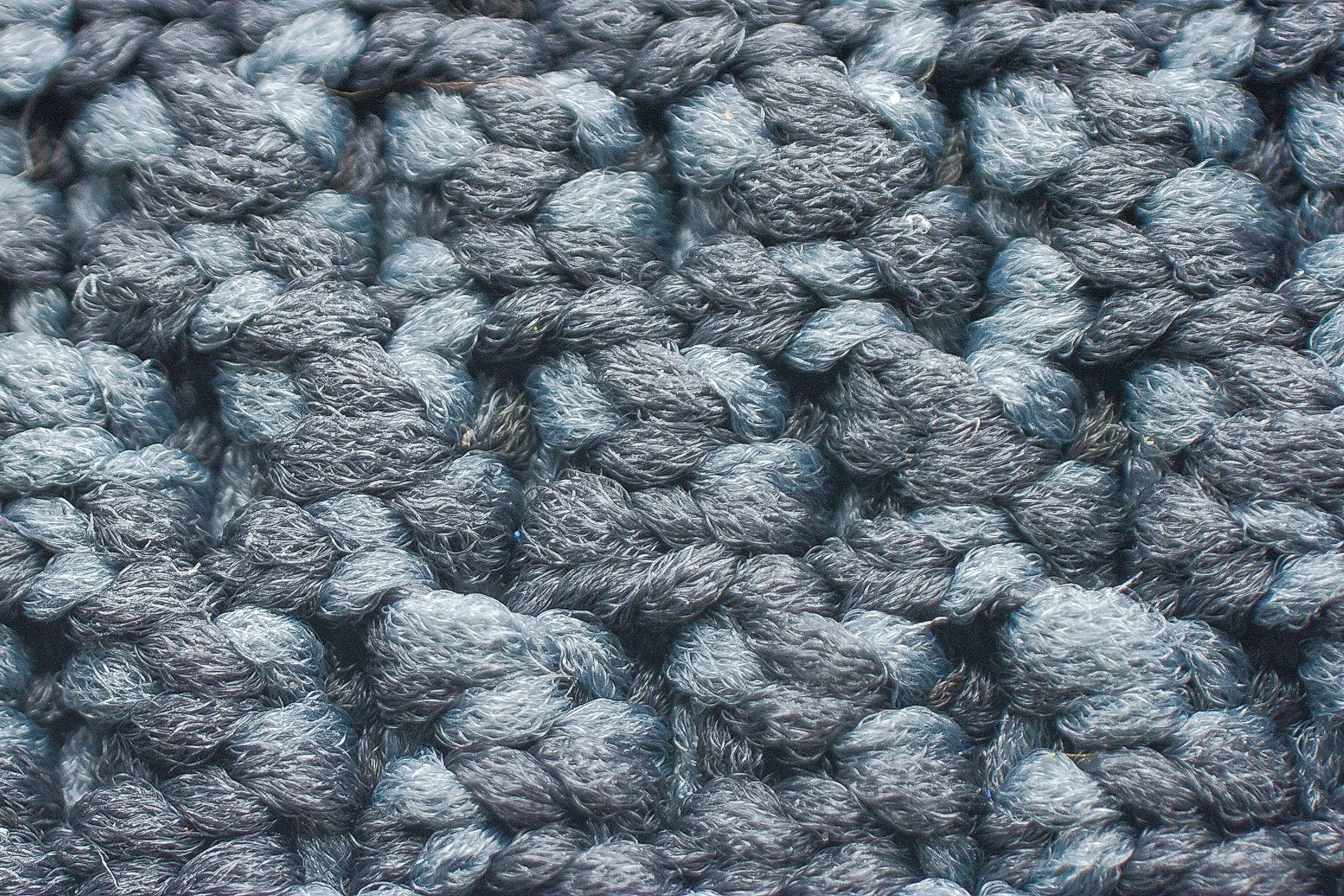
On a scale from 1 to 5, where 5 would be the most breathable, we gave the Hoka Restore TC the lowest score of 1. It is not an option for hot summer days.
| Hoka Restore TC | 1 |
| Average | 2.9 |
Stability
Lateral stability test
Checking the shoe's side-to-side support and stability, we can tell that it sits somewhere in the middle of the range.
Its wider-than-average platform and raised sidewalls will make the shoe stable enough for most people. But on the downside, the Restore TC lacks the arch support and stability elements needed to support a moderate-to-severe overpronation.
If you have flat feet and your ankles roll inwards excessively, we recommend looking into Skechers Arch Fit instead.
Torsional rigidity
Like we said, most people will find the Hoka Restore TC quite supportive for their day-to-day walks. The shoe has enough torsional rigidity to keep the foot in place.
Assessing it in our manual test, we rated the stiffness with an average score of 3 out of 5. The chunky platform with raised sidewalls makes it more rigid than the typical walking shoe.
| Hoka Restore TC | 3 |
| Average | 2.9 |
Heel counter stiffness
Despite its sizeable appearance, the heel counter of the Restore TC is not very rigid.
We could squeeze and fold it pretty effortlessly in our manual test. Thus, we gave it a rather low score of 2 on a 1-5 stiffness scale.
But it doesn't allow heel slippage and that's a huge bonus.
| Hoka Restore TC | 2 |
| Average | 2.4 |
Midsole width - forefoot
As befits a Hoka shoe, the Restore TC comes with very broad sole dimensions.
In the widest part of the forefoot, our calliper measured 116.0 mm which is about 5 mm wider than average.
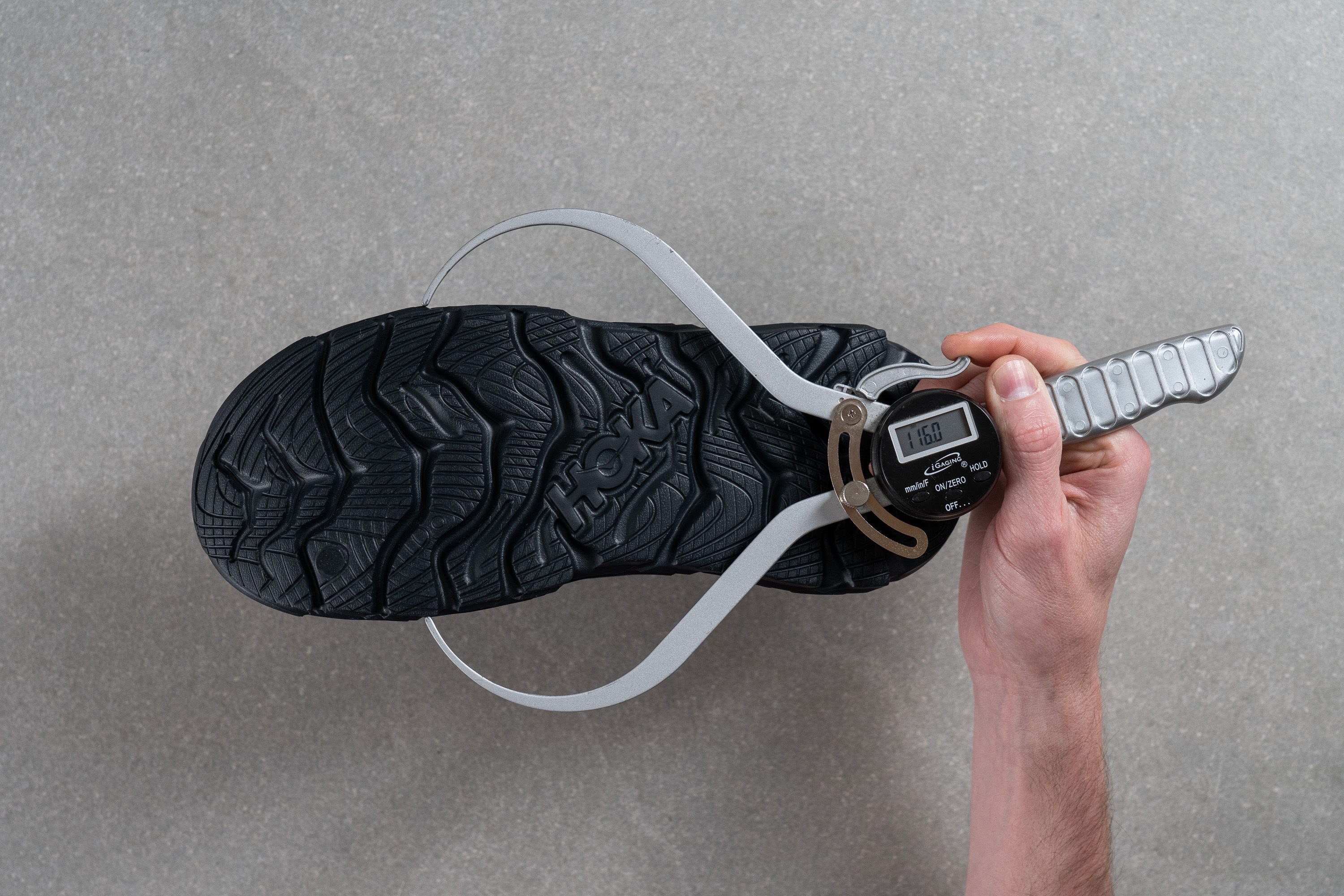
| Hoka Restore TC | 116.0 mm |
| Average | 112.0 mm |
Midsole width - heel
In the heel, the Restore TC beats all of the previous records showing an impressive 104 mm in the widest part! Expect to feel extra surefooted with such a broad contact area.
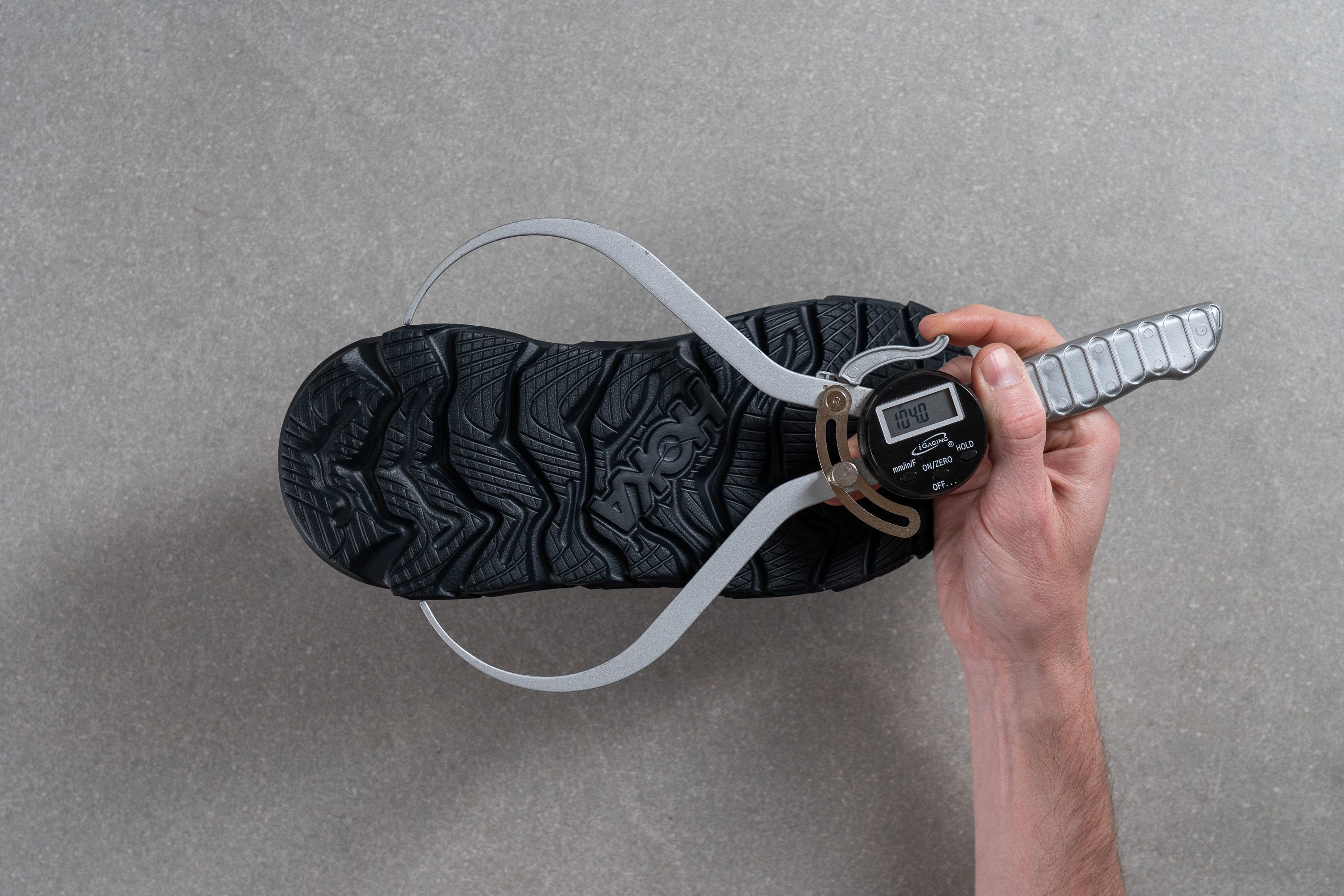
| Hoka Restore TC | 104.0 mm |
| Average | 90.3 mm |
Durability
Toebox durability
The Hoka Restore TC's upper may fall short of breathability, but it makes up for it with exceptional wear resistance.
It may seem like a delicate knit fabric but try tearing it apart and you will need more effort than you think. Add to that a wide protective toe cap and you have a recipe for a long-lasting shoe!
Putting the shoe's jacquard knit to our Dremel test for 12 seconds, we were amazed at how barely noticeable the damage was. For comparison, here is a glaring hole that the very same test left on the On Cloudrift!
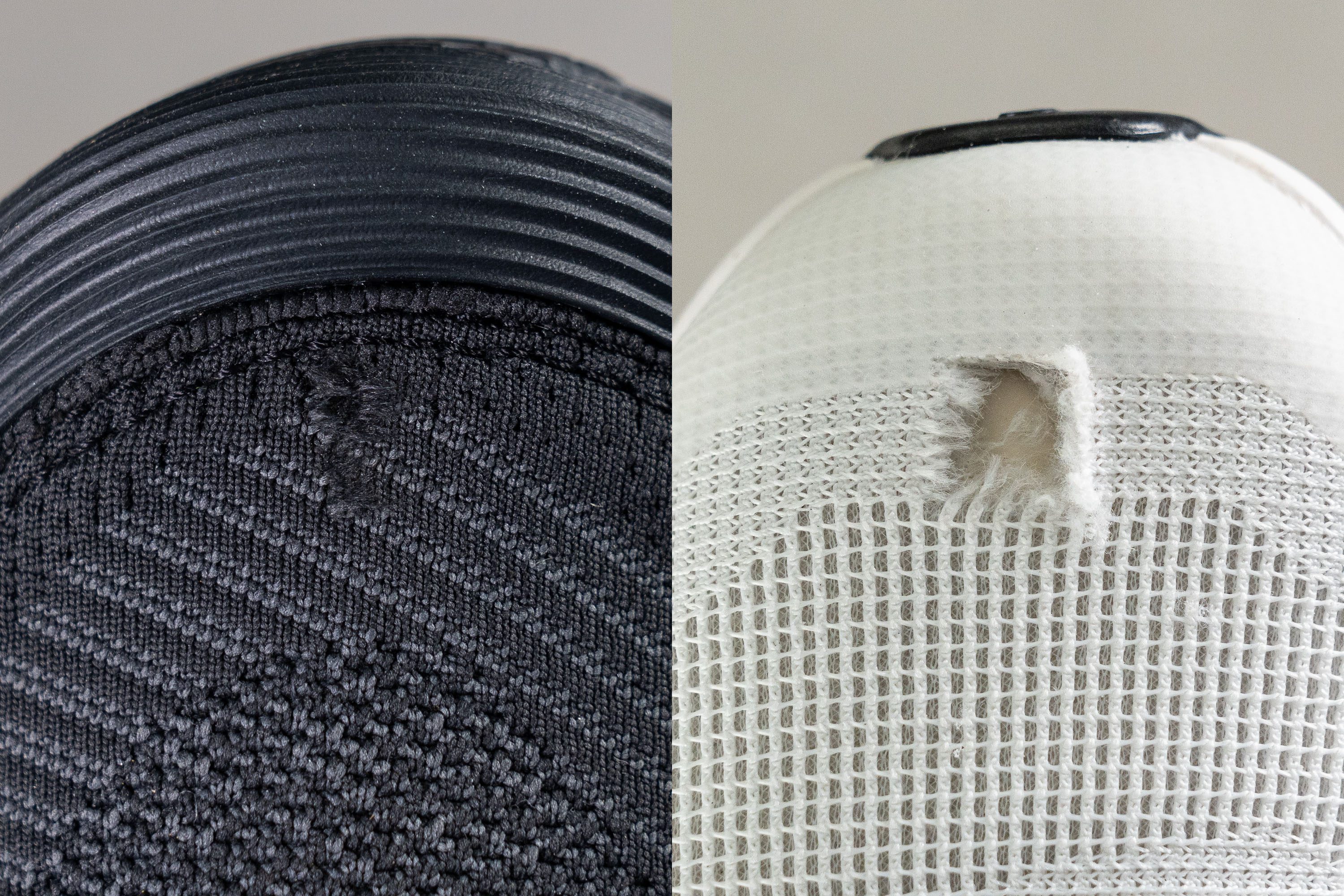
Rating the shoe's toebox durability on a 1 to 5 scale, the Hoka earns a solid 4.
| Hoka Restore TC | 4 |
| Average | 3.2 |
Heel padding durability
As a slip-on shoe, the Restore TC is ready for a lot of friction at the back of the heel collar. That's why Hoka reinforced the inner side of the shoe's heel with an additional textile layer.
It really helped the shoe to stand up to our 4-second Dremel test. Looking at the damage left by the tool's sandpaper tip, we rated its heel lining durability as 3 out of 5. One point better than average!
Sure, this part of the shoe is more prone to wearing out but at least it's sturdier compared to other walking shoes.
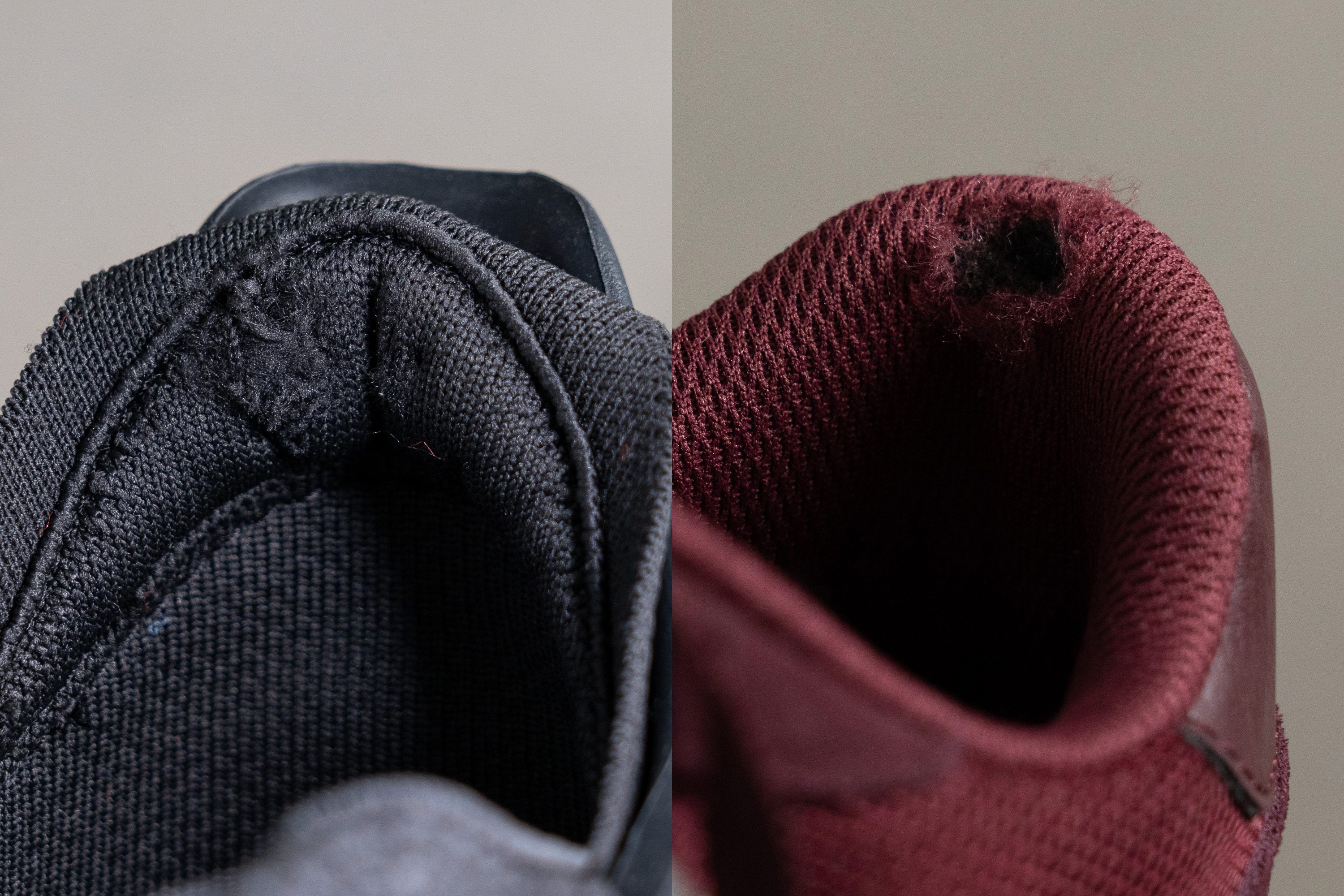
| Hoka Restore TC | 3 |
| Average | 2.3 |
Outsole hardness
The Hoka Restore TC has no rubber outsole which puts the exposed midsole at risk of faster abrasion.
Even though the foam has some firmness to it, our durometer returned a pretty low reading of 62.9 HC. It indicates that the shoe's midsole is 20% softer than the average rubber outsole and consequently, less durable.
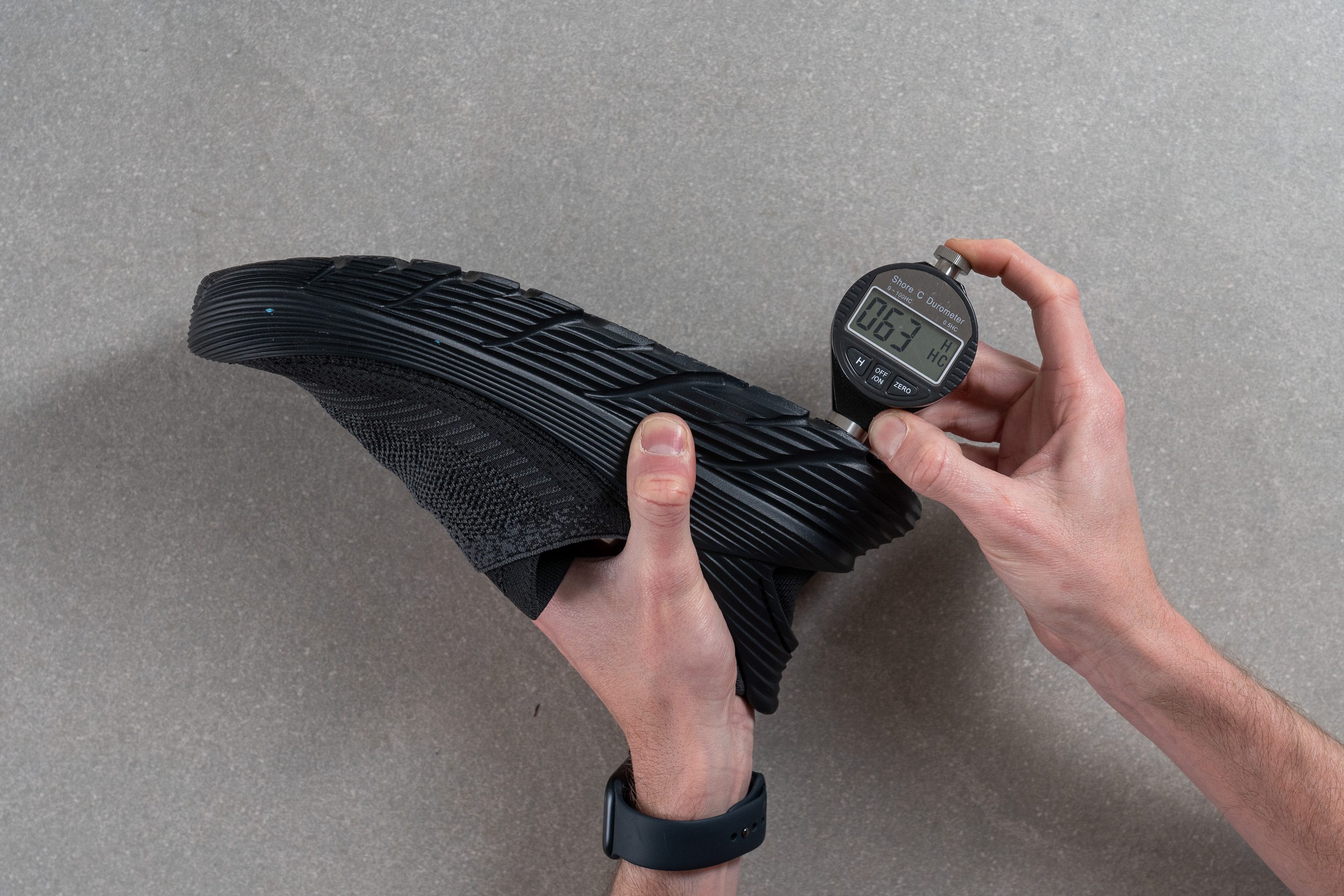
| Hoka Restore TC | 62.9 HC |
| Average | 78.0 HC |
Outsole durability
With our Dremel set to the relentless speed of 10K RPM, we drilled the bottom of the shoe for 22 seconds. It is our standard condition for testing outsole durability, no exceptions.
As you can see from the video above, our tool burned right through the foam as if it were made of butter.
It was not a huge surprise when our tread gauge showed a whopping 6.0 mm of damage in the foam. It is even deeper than the dents we got in soft Skechers shoes (3 mm on average)!
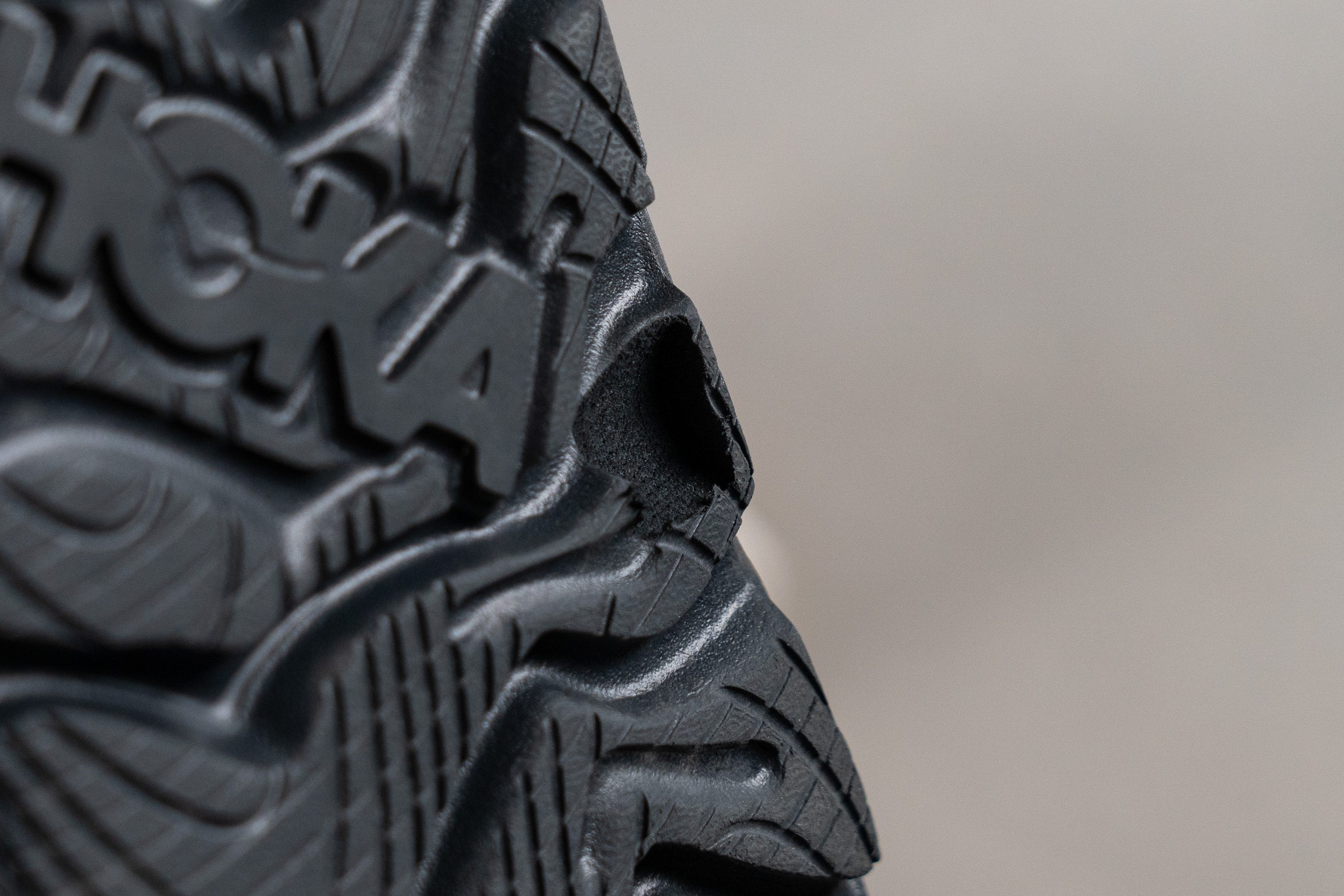
| Hoka Restore TC | 5.9 mm |
| Average | 1.4 mm |
Outsole thickness
If you want a long and happy life for your pair of Hoka Restore TCs, we recommend limiting its use to less abrasive surfaces. It's better to avoid asphalt, cobblestone, rocky trails, and the like.
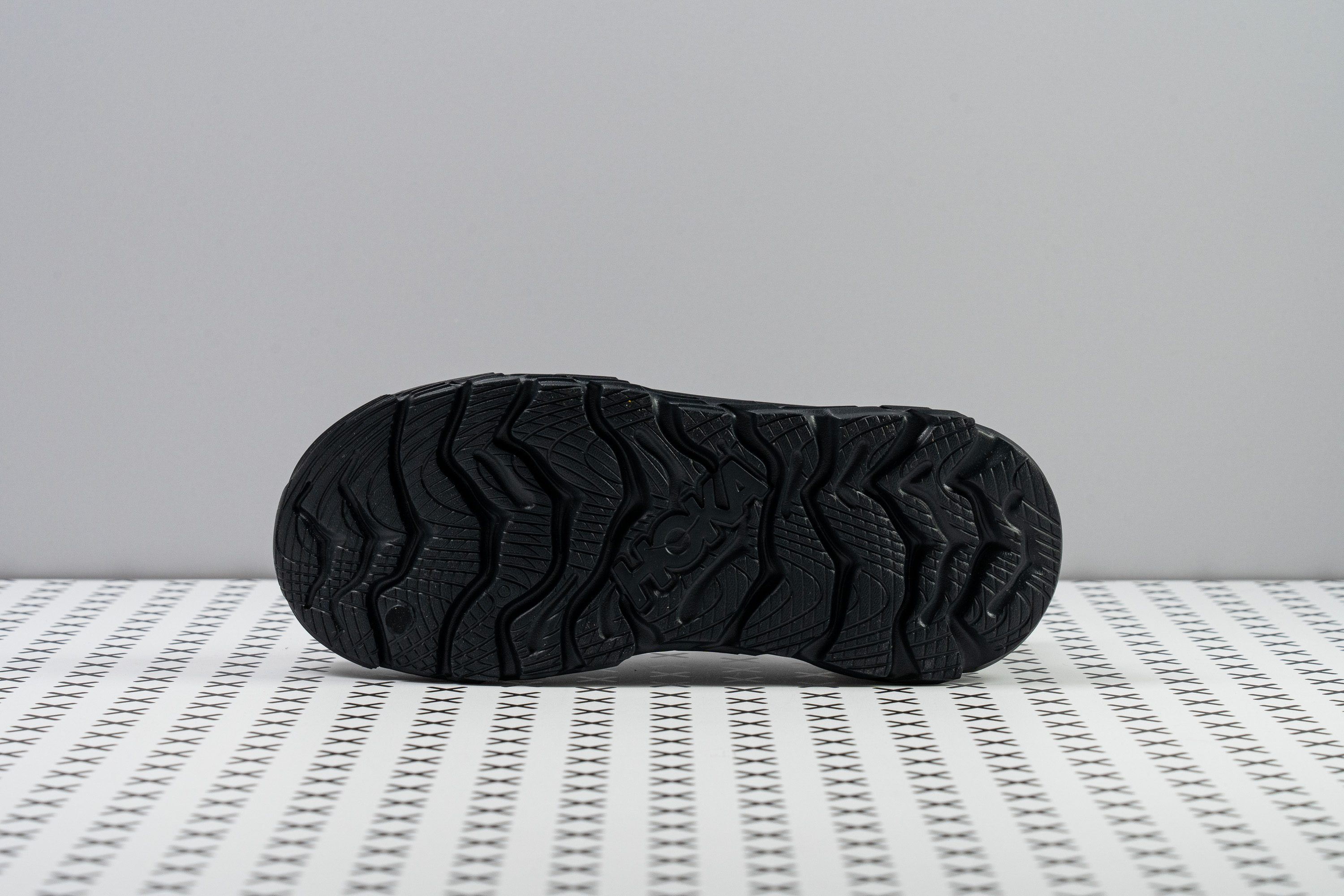
| Hoka Restore TC | 0.0 mm |
| Average | 3.0 mm |
Misc
Insole thickness
Instead of being an additional component, the insole of the Hoka Restore TC functions as the shoe's primary cushioning.
With an impressive thickness of 16.9 mm, it is an elephant in the shoe!
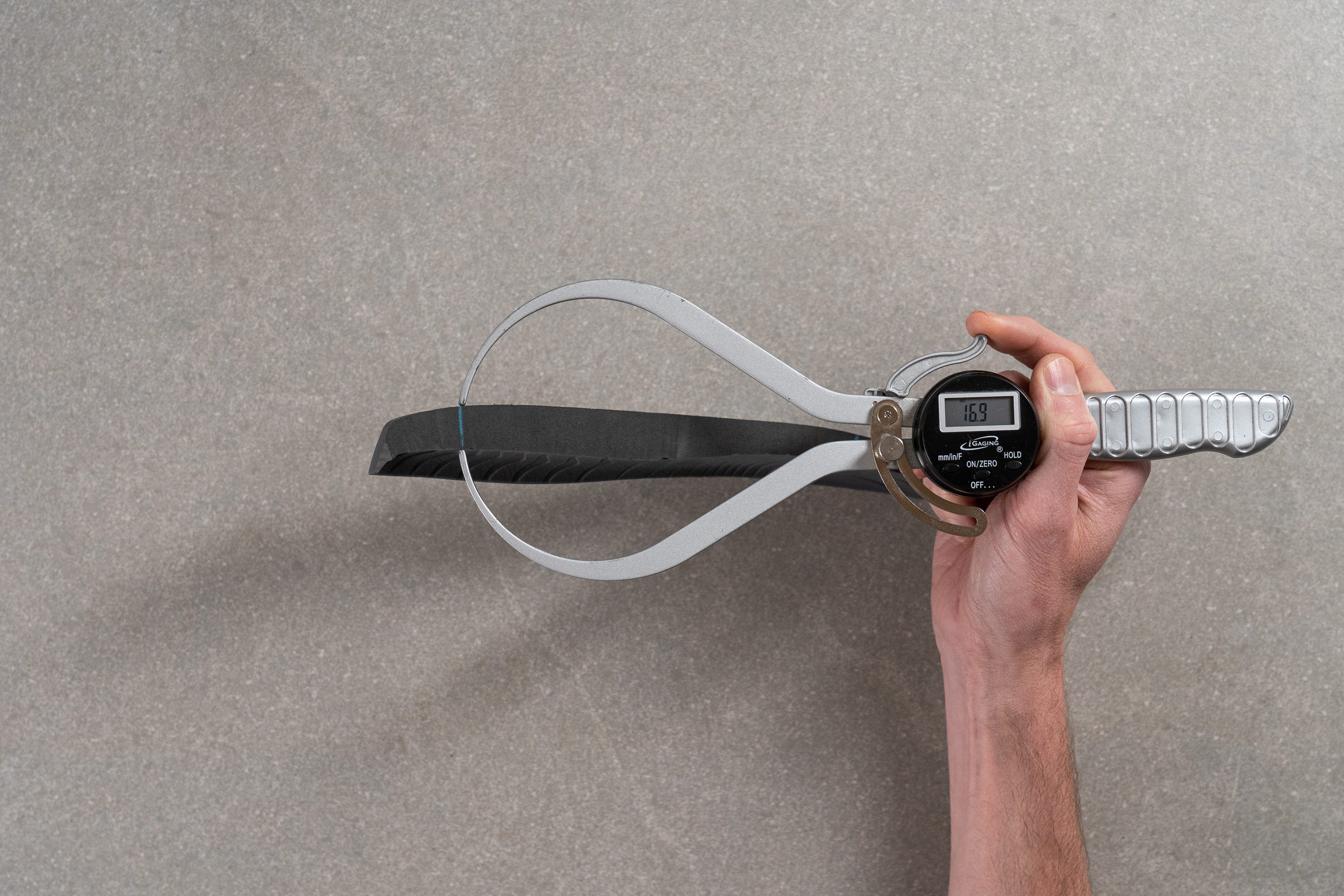
| Hoka Restore TC | 16.9 mm |
| Average | 5.8 mm |
Removable insole
The shoe's insole is removable but we wouldn't recommend replacing it with your own.
Considering its extreme thickness and the fact that it works as the shoe's primary cushioning, it would be tricky to find a replacement.
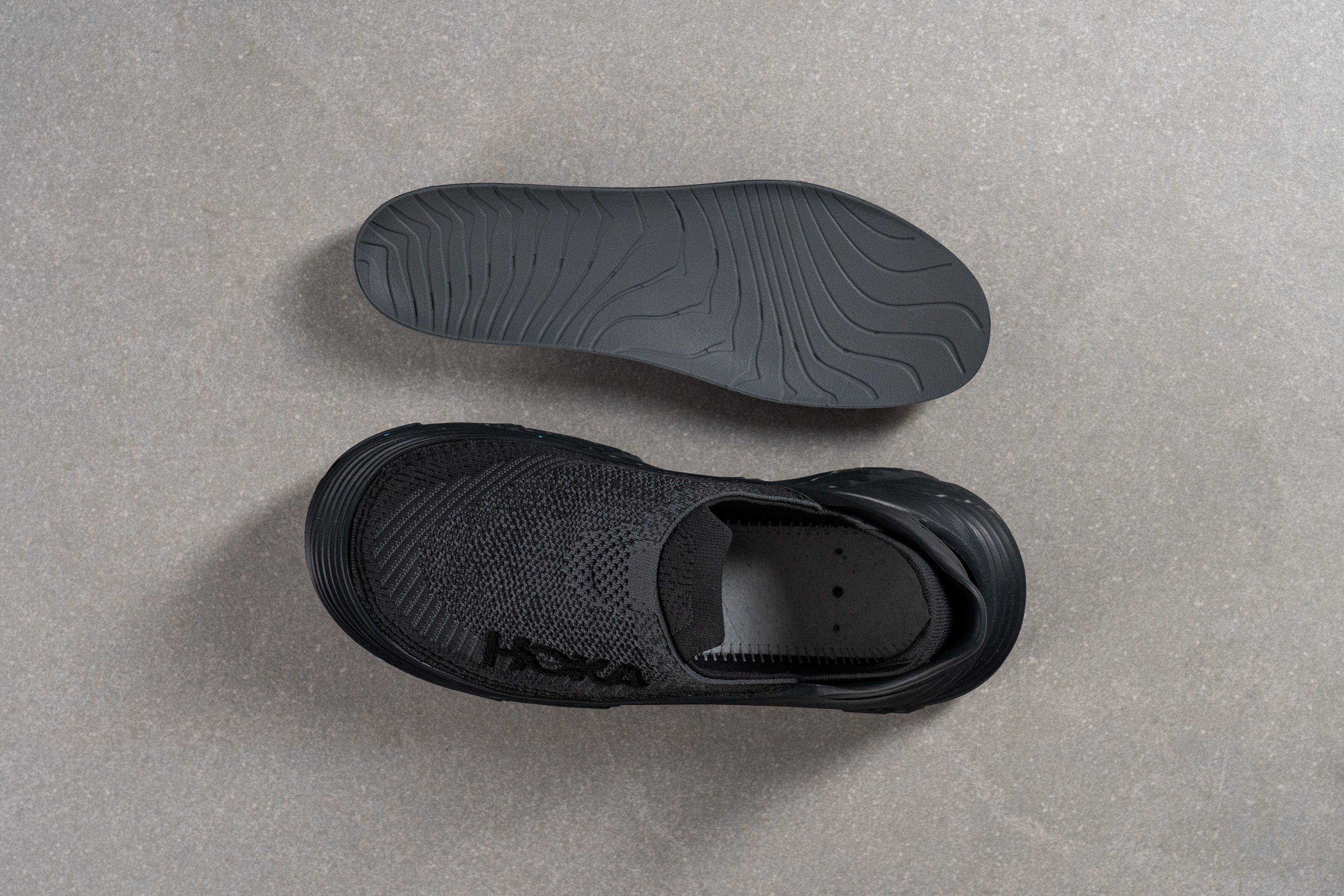
| Hoka Restore TC | Yes |
Reflective elements
There are no reflective elements on the Hoka Restore TC.
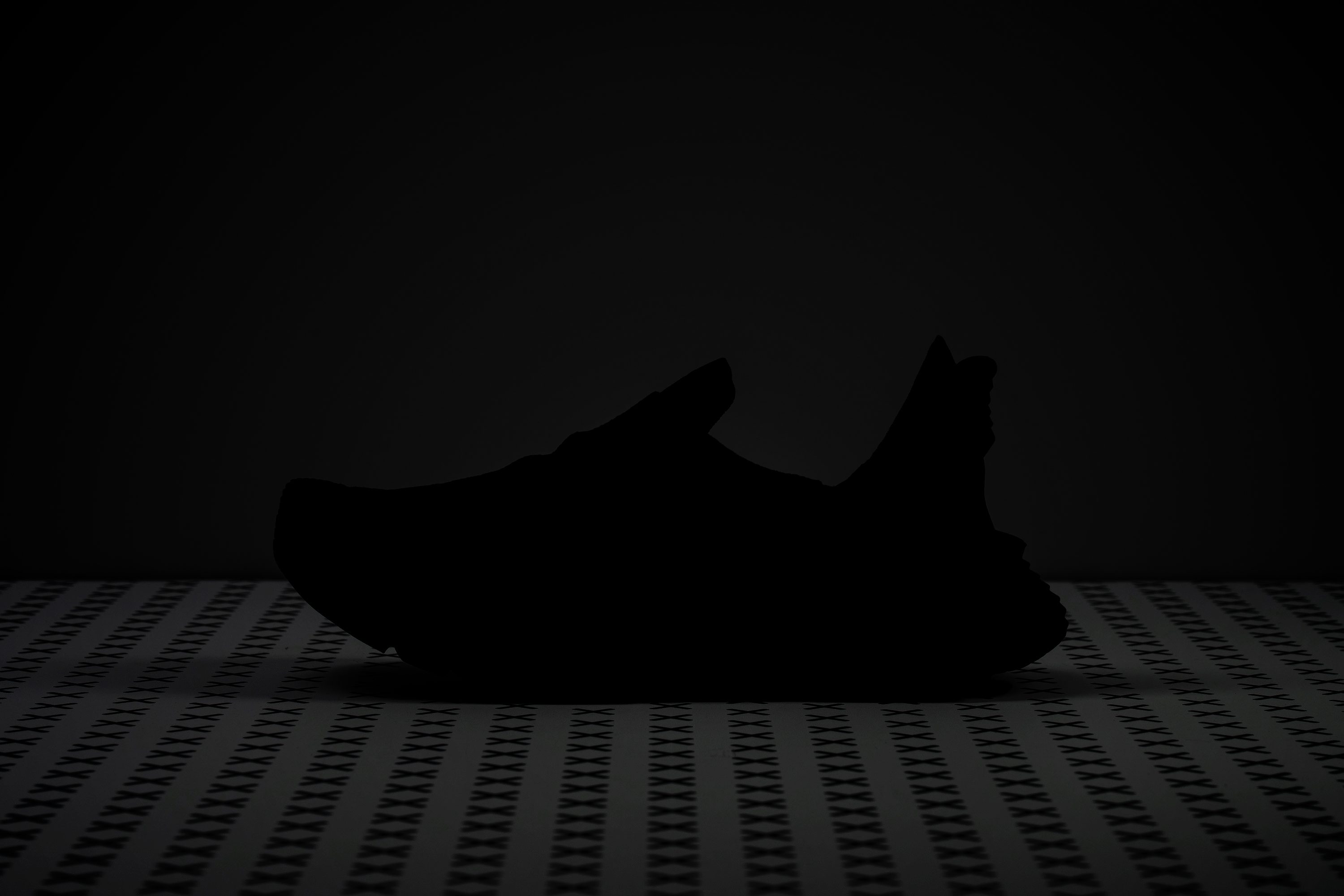
| Hoka Restore TC | No |
Tongue padding
The Restore TC's upper is pretty thin, showing only 2.5 mm of material thickness on top of the instep. But you don't really need more padding as the shoe has no laces either.
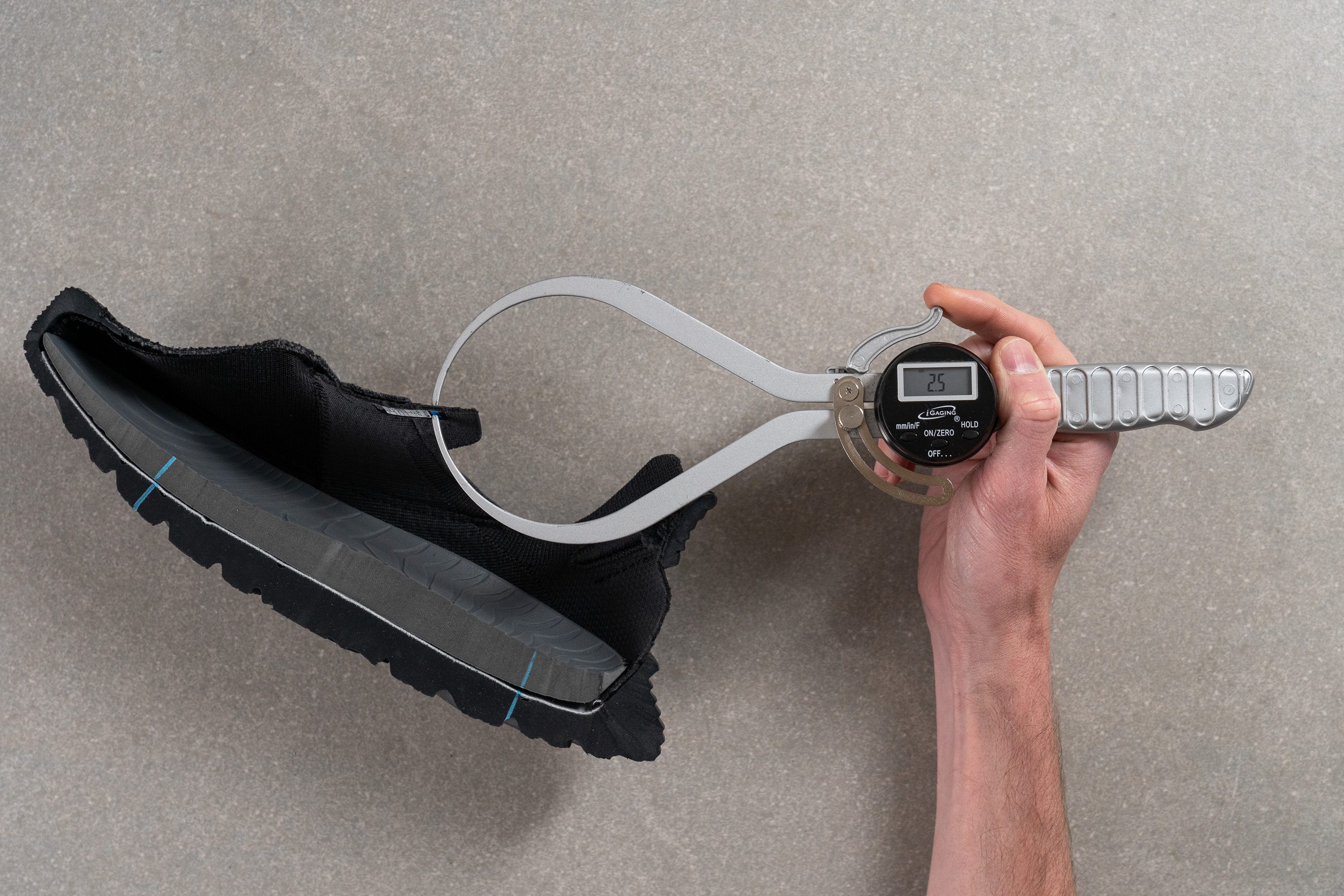
| Hoka Restore TC | 2.5 mm |
| Average | 5.6 mm |
Tongue: gusset type
The Hoka Restore TC features a sock-like bootie that envelopes the foot in a snug but cosy manner. According to the brand, it is even suitable for sockless wear.
Personally, we found it to be okay to wear barefoot but wouldn't recommend it. If the weather gets warm enough to make your feet sweat, the shoe's lack of breathability will cause unpleasant odour and even hot spots.
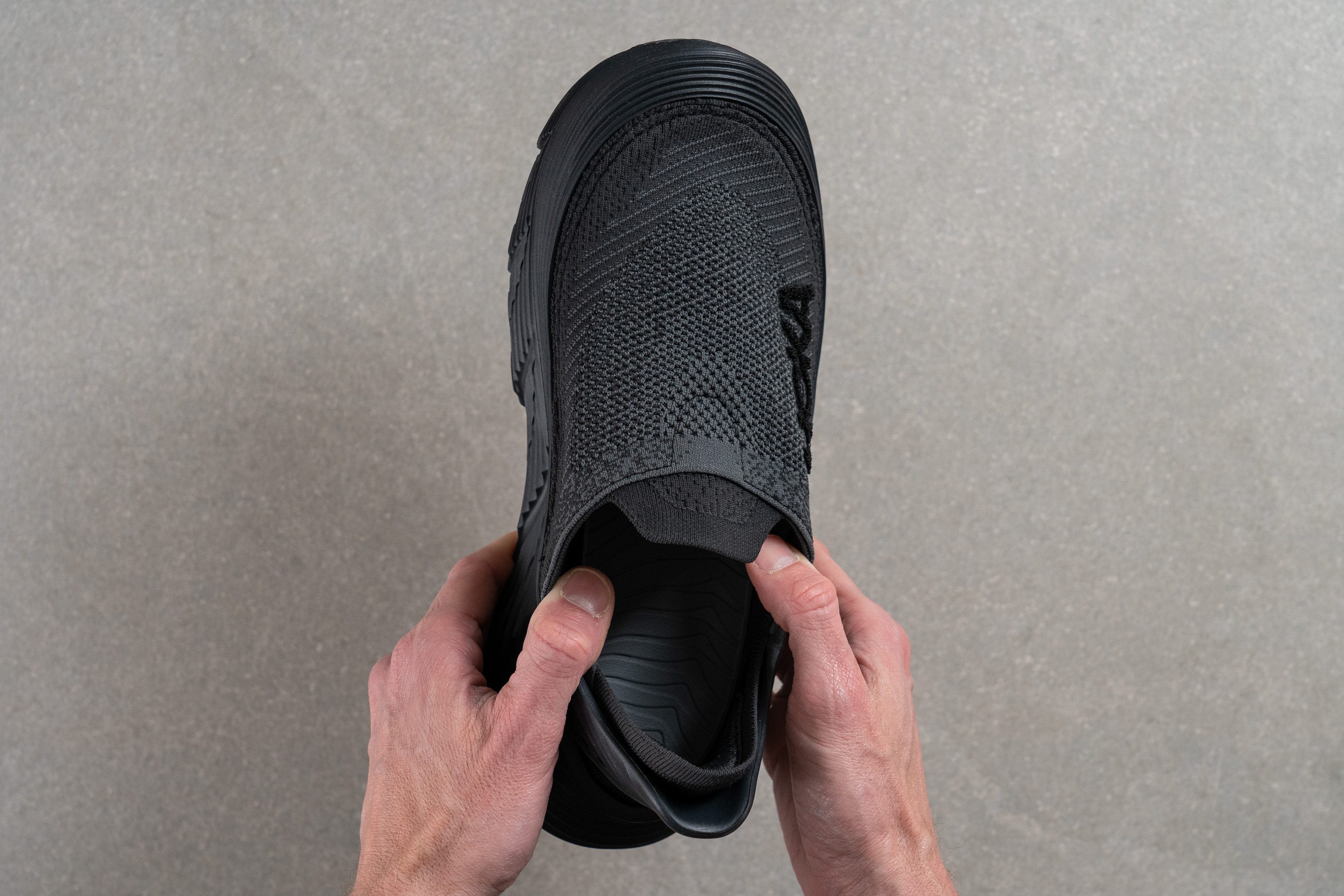
| Hoka Restore TC | Sock like |
Heel tab
One of the shoe's main highlights is how fast and convenient it is to get on and off.
Its extended wing-like heel collar is very handy and works almost like a shoehorn. Sliding into the Restore TC takes mere seconds and requires only one hand.
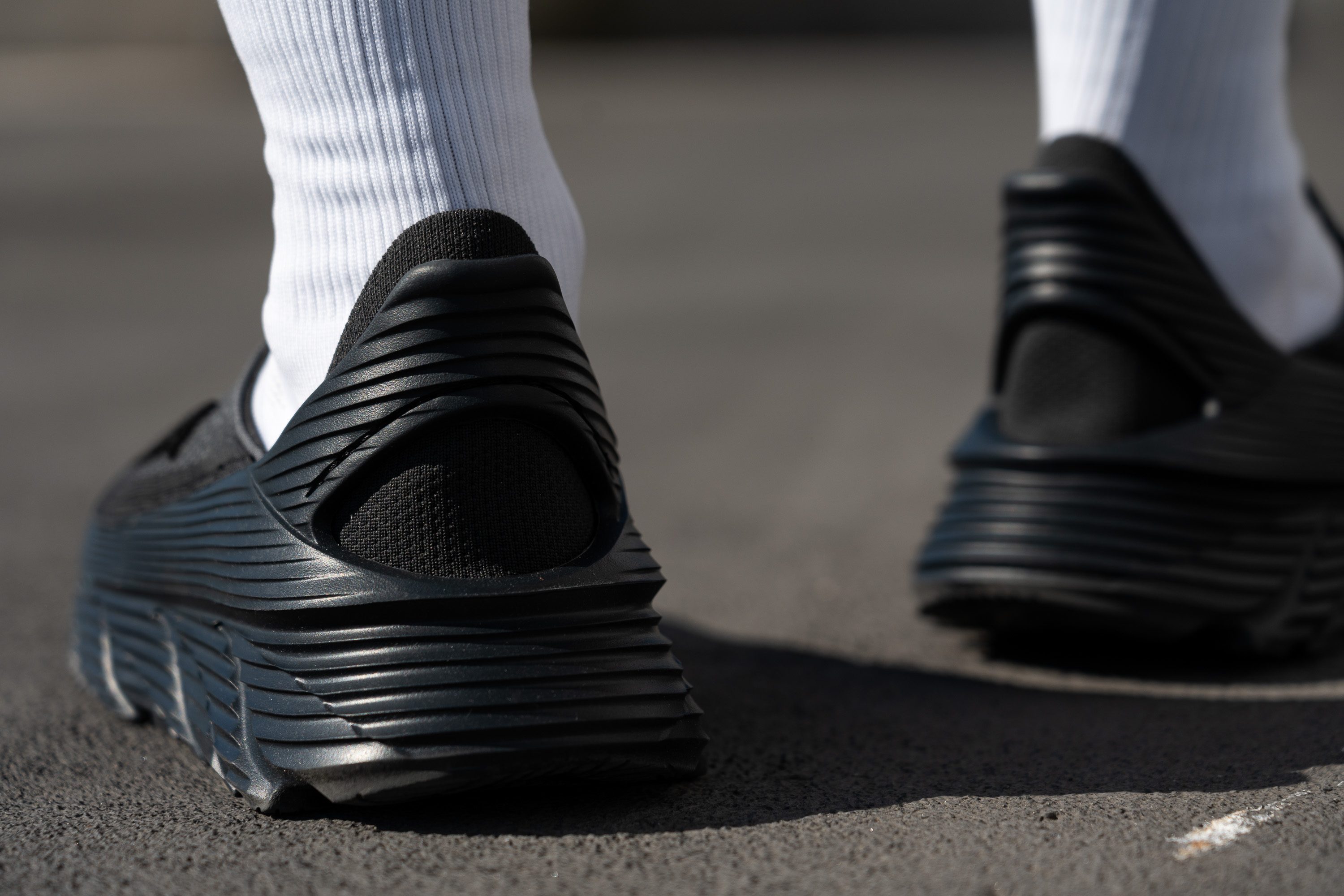
| Hoka Restore TC | Extended heel collar |
Sustainability
TC stands for Thoughtful Creation.
In an attempt to make its products more sustainable, Hoka designed the Restore TC with recycled and environmentally friendly materials including:
- 73% dope-dyed polyester in the upper (dope-dying uses fewer chemicals and reduces water consumption)
- 83% dope-dyed polyester in the inner bootie
- 30% sugarcane-based EVA insole
- 100% recycled polyester strobel board
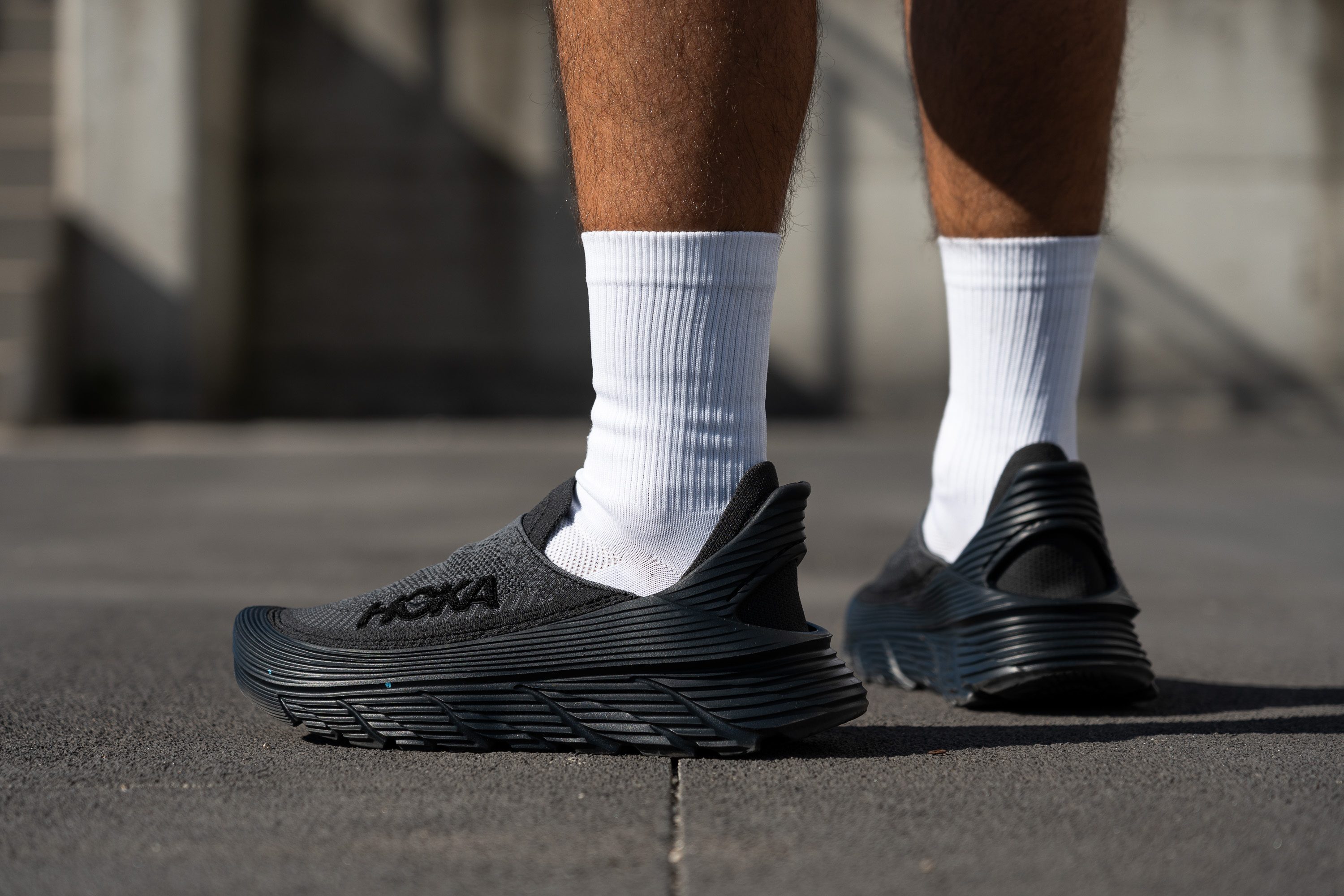
Terry logo
Oh, boy, that soft terry Hoka logo got us obsessed. We just couldn't stop touching it!
